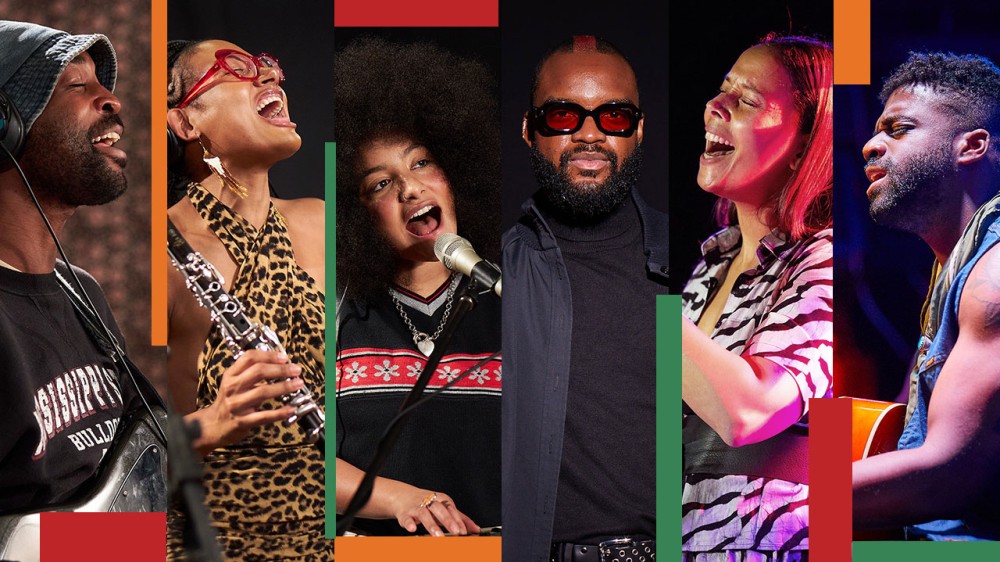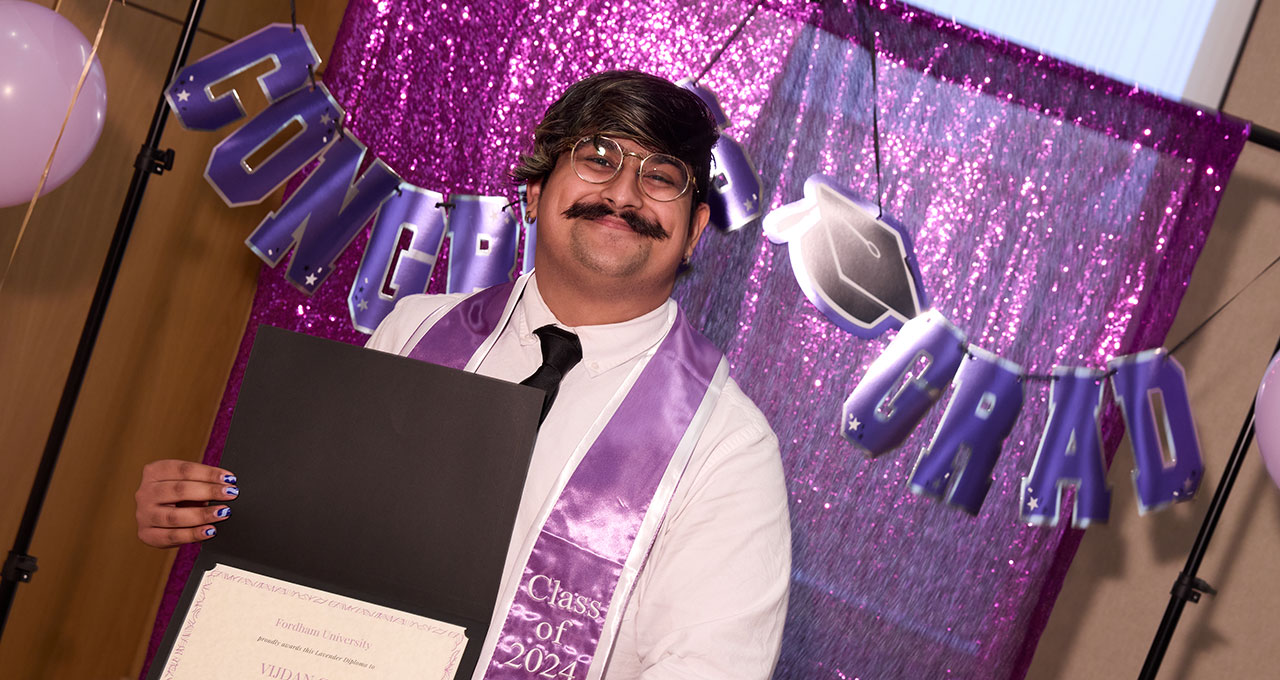


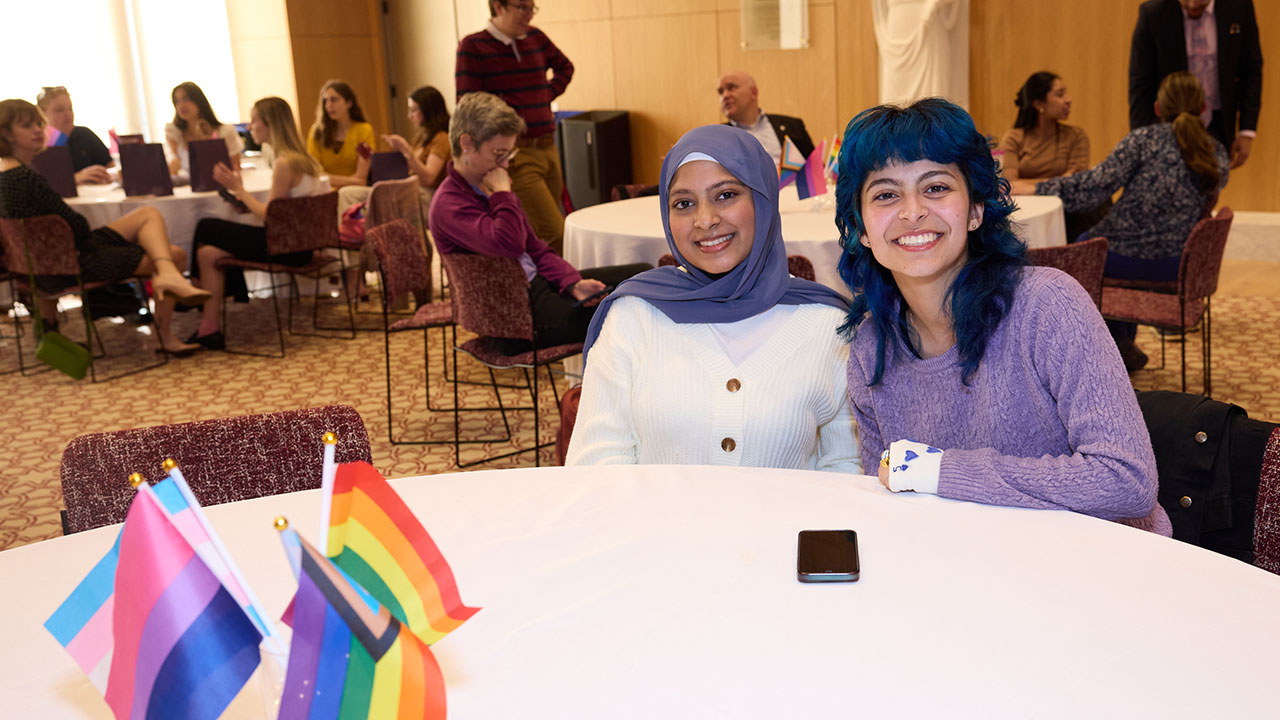


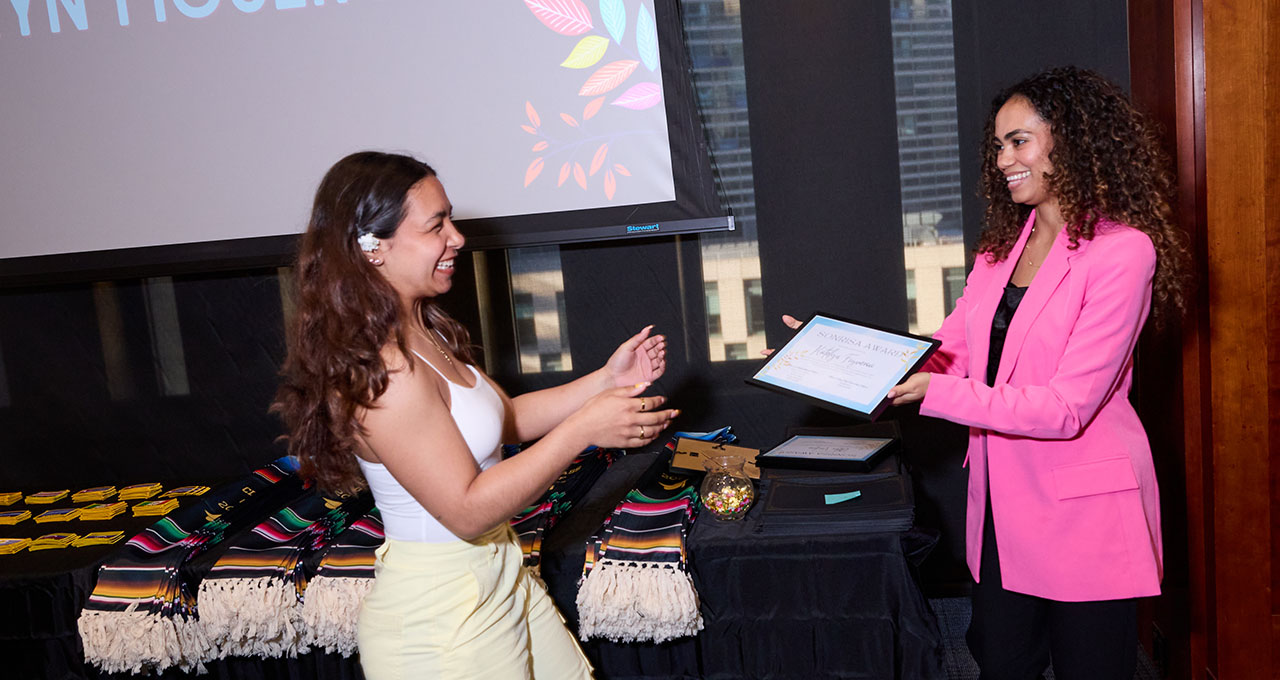


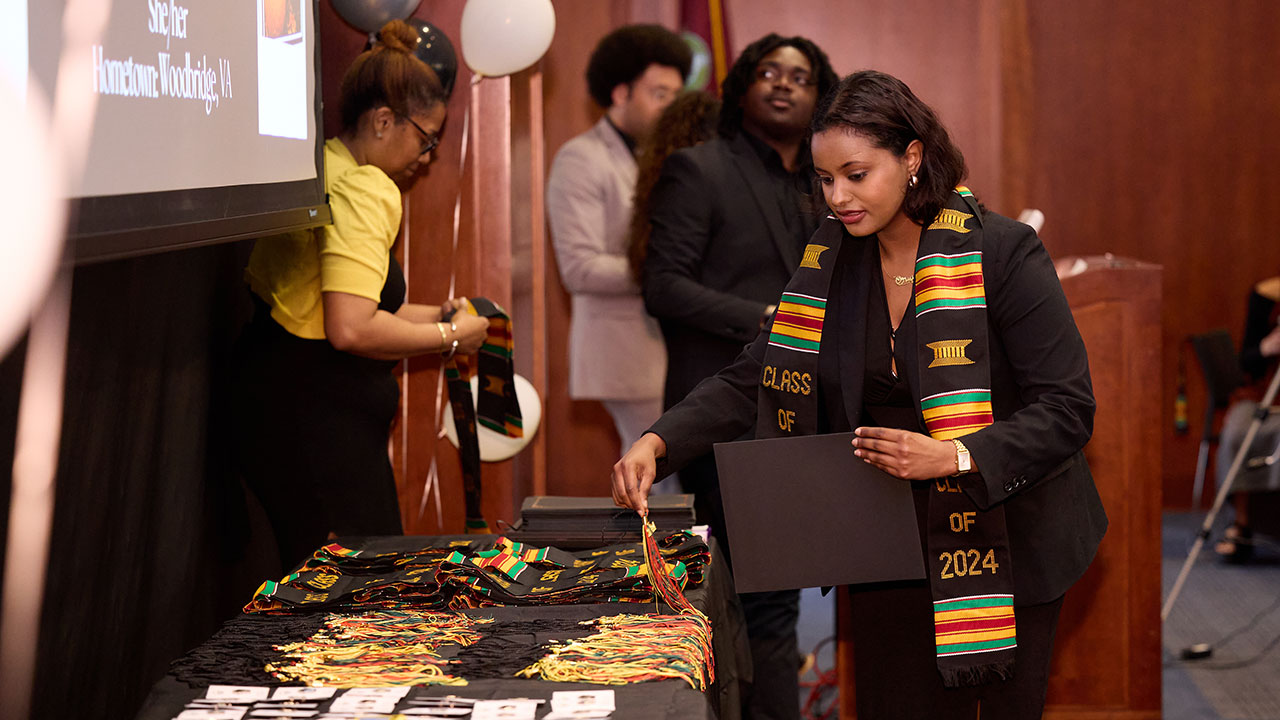
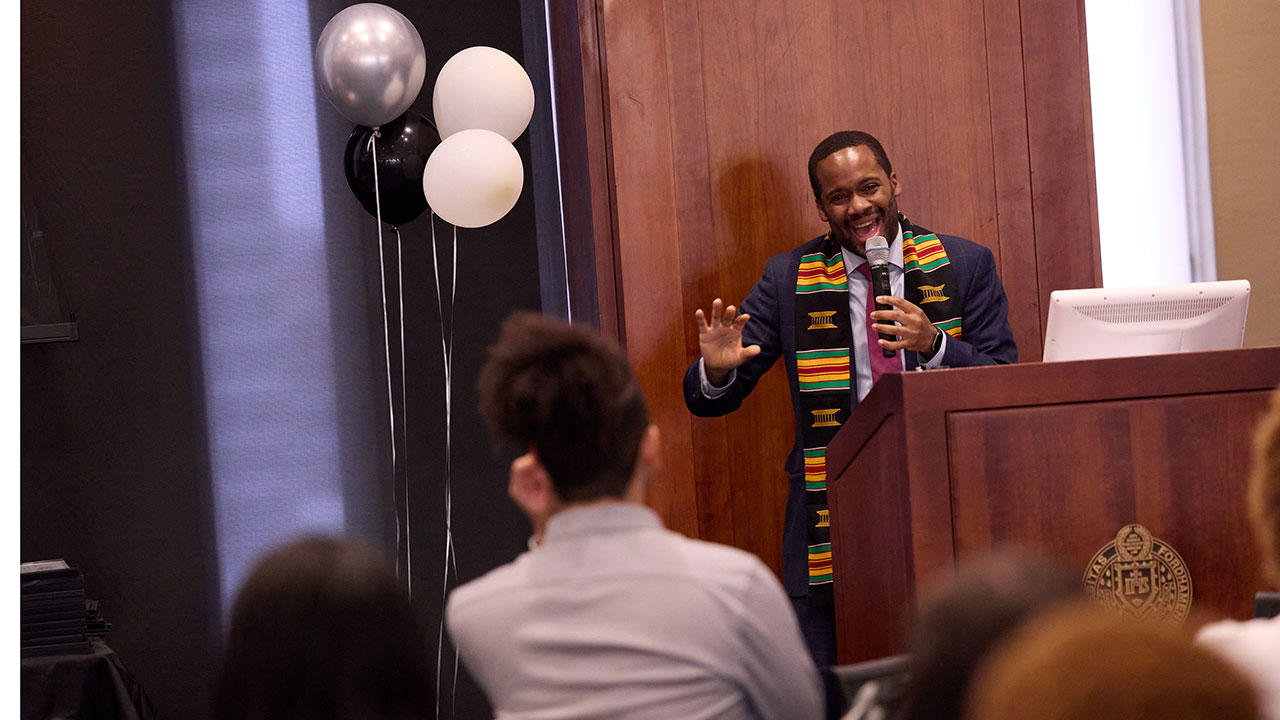
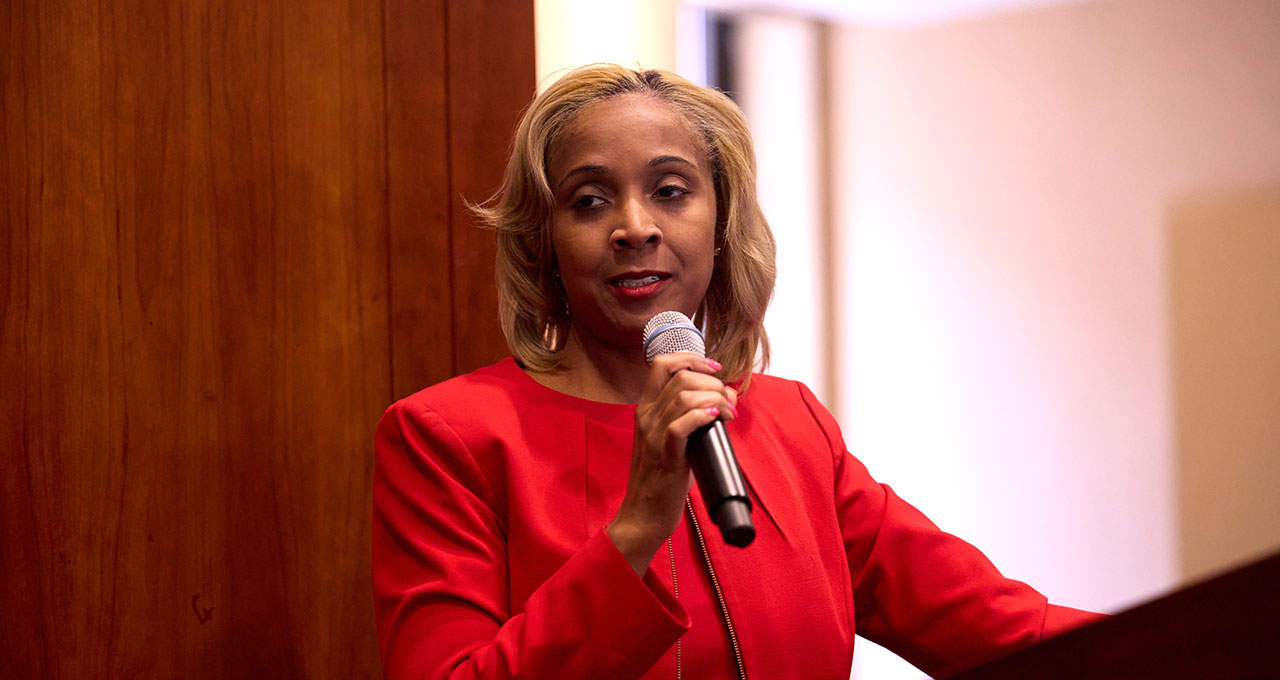
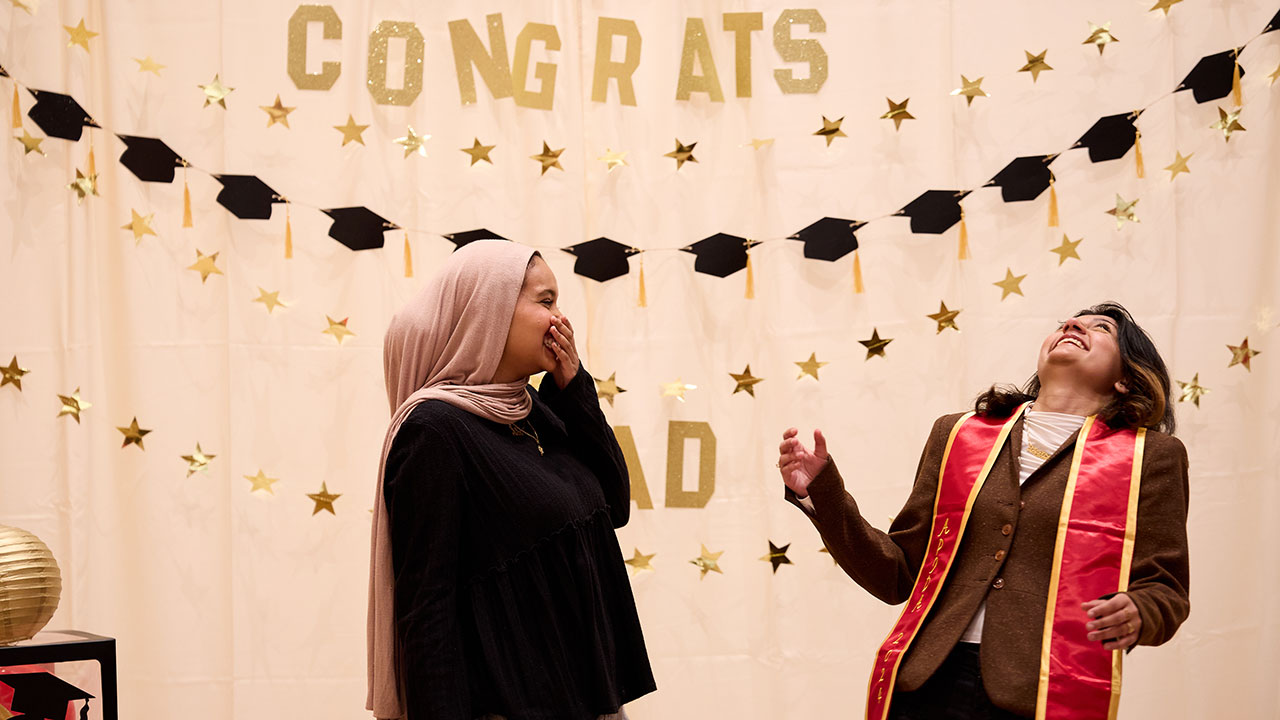
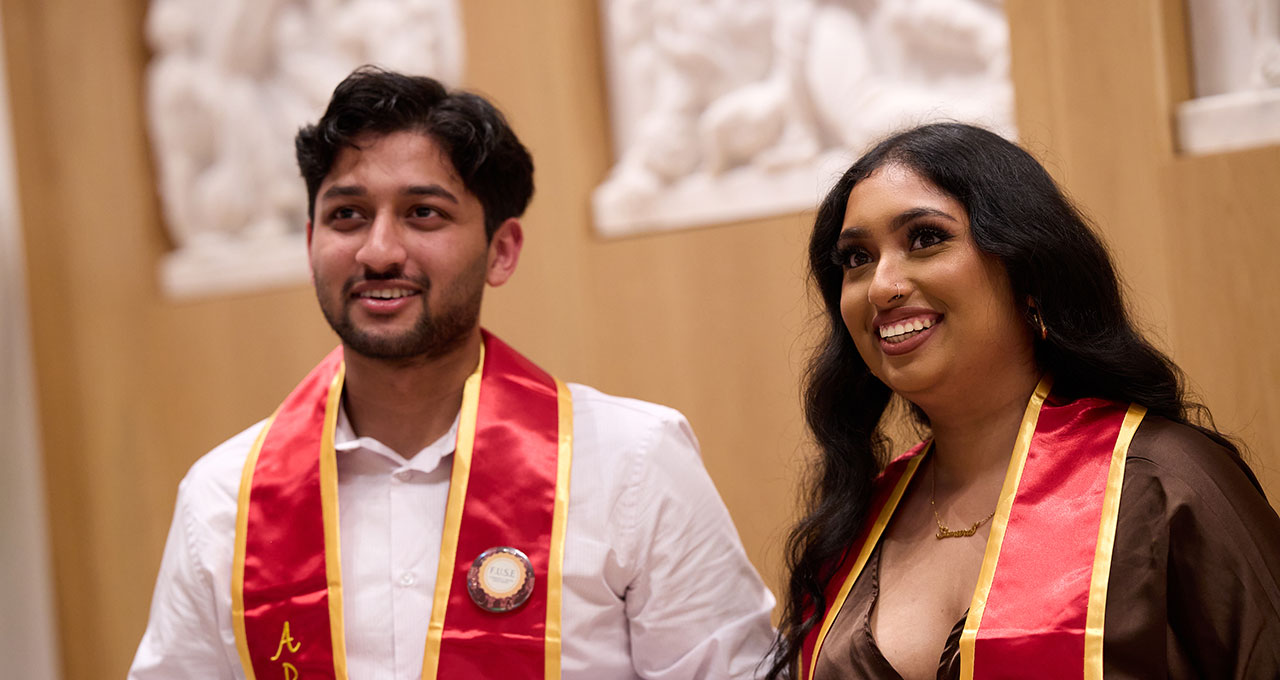
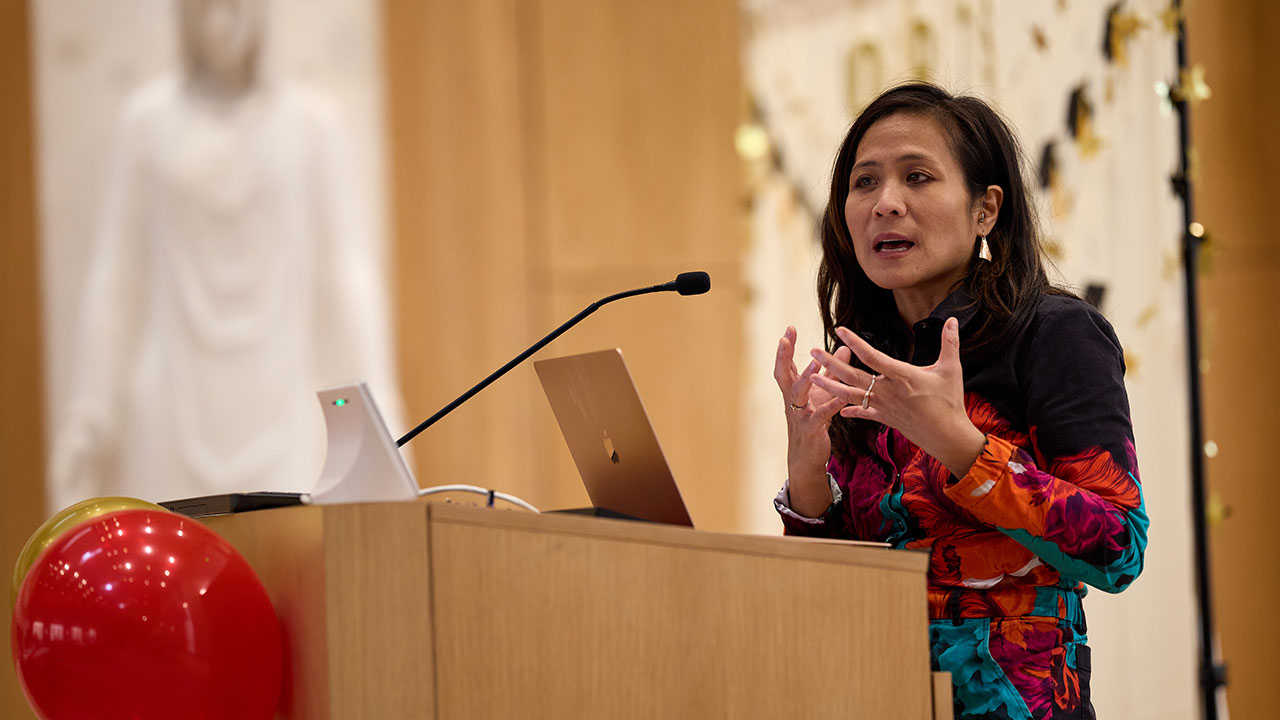
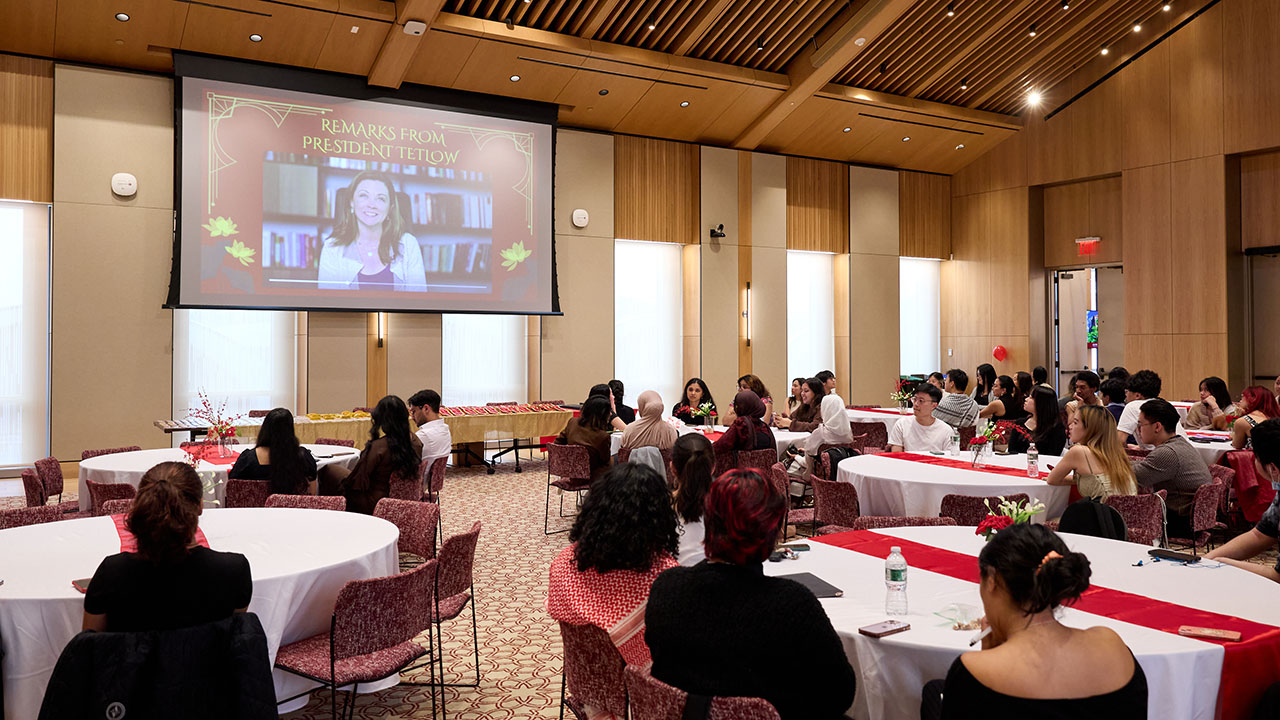
Photos by Argenis Apolinario
Graduating seniors celebrated their heritage and culture at four diversity graduation ceremonies held from April 30 to May 6.
“I am so proud of what each and every one of you has achieved,” Tania Tetlow, president of Fordham, said in a video message to students.
“Take a moment to give yourself a hug and to revel in everything that you’ve achieved because it is an extraordinary thing, these years of hard work and determination and talent, and glorious love of learning.”
In total, more than 300 students were recognized at the Asian, Pacific Islander, Desi American (APIDA); Black; Latine; and Lavender (LGBTQ+) graduation celebrations.
Held at both the Lincoln Center and Rose Hill campuses, the celebrations were sponsored by the Office of Multicultural Affairs, Office of the Chief Diversity Officer, Office of the President, and the 2024 Senior Week committees.
Remember, on the evening of May 18, New York’s Empire State Building will be illuminated in Fordham maroon for our graduates.
Below are the award winners for each graduation.
Lavender Graduation
George Takei Arts & Media Award – LC Recipient: Maura Johnston
George Takei Arts & Media Award – RH Recipient: Julia Patterson
Marsha P. Johnson & Sylvia Rivera LGBTQ+ Activism Award – RH Recipient: Dorothy Bogen
Marsha P. Johnson & Sylvia Rivera LGBTQ+ Activism Award – LC Recipient: Kenneth Tang
Audre Lorde LGBTQ+ Research Award – RH Recipients: Fareea Khan and Tarchithaa Chandra Sekharan
Fr. Bryan N. Massingale Faculty/Staff LGBTQ+ Award – LC Recipient: Joe Corcoran
Fr. Bryan N. Massingale Faculty/Staff LGBTQ+ Award – RH Recipient: Juan Carlos Matos
Award of Excellence for Outstanding Contributions to the Office of Multicultural Affairs: Dorothy Bogen
Latine Graduation
Sonrisa Award – LC Recipient: Katelyn Figueroa
Sonrisa Award – RH Recipient: Alan Ventura
Estrella Award – LC Recipient: Ernesto Perez
Estrella Award – RH Recipient: Caitlin Asper
Pa’Lante Award – LC Recipient: Andy Cuzco
Pa’Lante Award – RH Recipient: Hector Cruz
Black Graduation
Black Leadership Award – RH Recipients: Tamia Chaney, Chelsea Usiomwanta, Alan Ventura
Black Leadership Award – LC Recipients: Katelyn Figueroa, Rebecca Richmond, Mary Bookman
Black Leadership Award in Athletics – RH Recipient: Skylar Harris
Black Leadership Award in the Fine Arts – LC Recipient: Kierstin Oliver
Black Leadership Award in the Fine Arts – RH Recipient: Zhane Coleman
Black Excellence in STEM Award – RH Recipients: Kennedy Jeter and Kiara Pile
Black Excellence in Business Award – RH Recipient: Janel Codjoe
APIDA (Asian, Pacific Islander, Desi American) Graduation
]]>Lotus Leadership Award – RH Recipients: Tarchithaa Chandra Sekharan and Elena Roden
Lotus Leadership Award – LC Recipient: Kenneth Tang
Most Likely to Sell Out a Lincoln Center Concert: Marie Isabelle Antendido
Most Likely to be on the Cover of Vogue, GQ, Elle, and/or Harper’s Bazaar: Meilin Renee Morefield
Most Likely to Start a Successful Youtube Channel: Julie Kae Trohan
Most Likely to Become Tik Tok Famous: Genesis Yi
Most Likely to Survive the Last of Us: Stacey Dana Zaragoza Cajita
Most Likely to Win Physical: 100: Alexander Joel Lang Hom
Most Likely to be the CEO/Director of their own Company: Yoshimi Pualani Eder
Award of Excellence for Outstanding Contributions to the Office of Multicultural Affairs: Kenneth Tang
*This is a working list. It will be updated as new events are planned.
Love Your Skin: A Tabling Event
Thursday, Feb. 15, 1 p.m.; Lowenstein Plaza, Lincoln Center Campus
Sponsored by the Black Student Alliance at Lincoln Center and the Office of Multicultural Affairs
WFUV Presents: Music of the Civil Rights and Black Consciousness Movements
The names of many Black artists and cultural icons are woven throughout the decades of the Civil Rights and Black Consciousness Movements, including Nina Simone, Max Roach, Gil Scott-Heron, Archie Shepp, James Brown, John Coltrane, Sly Stone, Curtis Mayfield and more, with the inclusion of Civil Rights allies like Bob Dylan. “Music of the Civil Rights and Black Consciousness Movements” examines the critical social revolution taking place in America and the popular music that accompanied it,
Thursday, Feb. 15., 10 p.m. to midnight; Listen at 90.7 FM, streaming online
Casa Noir
Join the Caribbean and African Student Association for a night of elegance and illusion celebrating Black History Month.
Friday, Feb. 16, 7 – 9 p.m.; McShane Great Hall, Rose Hill Campus
Ilyasah Shabazz: Empowering Voices—A Legacy of Inclusion Within the Youth
Shabazz is the daughter of Malcolm X and Betty Shabazz and the author of the memoir Growing Up X (One World, 2003)
Tuesday, Feb. 20, 5:30 p.m.; Fordham Prep Theater, Rose Hill Campus
Sponsored by ASILI, the Black Student Alliance at Rose Hill; the Office of Multicultural Affairs; and the Office of the Chief Diversity Officer
WFUV Presents Ashford & Simpson: The Real Thing
Nicholas Ashford and Valerie Simpson look back on their long career as influential songwriters, producers, and performers. WFUV’s Jeff Foxx hosts with stories behind songs like “Ain’t No Mountain High Enough,” “I’m Every Woman,” “Solid,” and more classics this songwriting duo wrote for themselves and artists like Diana Ross, Ray Charles, Chaka Khan, and Marvin Gaye & Tammi Terrell.
Tuesday, Feb. 20, 9 – 10 p.m. and Thursday, Feb. 22, 10 – 11 p.m.; Listen at 90.7FM, streaming online
Karaoke Night
Thursday, Feb. 22, 5:30 p.m.; Rose Hill Commons, Rose Hill Campus
Sponsored by the Office of Multicultural Affairs
Black History Month Art Showcase
Thursday, Feb. 22; Lowenstein, 12th floor, Lincoln Center Campus
Sponsored by the Black Student Alliance at Lincoln Center and Fashion For Philanthropy. Undergraduates only
The Melanin Expo
Thursday, Feb. 22, 12 – 3 p.m.; Lowenstein Plaza, Lincoln Center Campus
Sponsored by the Office of Multicultural Affairs
The Third Annual Eunice Carter Lecture presents A Moderated Conversation with Michelle Alexander “Beyond The New Jim Crow”
Michelle Alexander has played a pivotal role in breaking the silence about racial injustice in the American criminal legal system. Her bestselling book, The New Jim Crow, helped to spark a wave of discussion, debate and activism nationwide. The book explores the political, legal and social dynamics that have led to the morphing and rebirth of systems of racial and social control in the United States, most recently mass incarceration. Alexander points to the wars on crime and drugs, as well as a legal regime that facilitates discriminatory enforcement of our nation’s criminal laws, as central to the maintenance of racial inequality in this country. She persuasively argues, “We have not ended racial caste in America; we have merely redesigned it.” In the years since the publication of The New Jim Crow, Alexander has published opinion pieces on a wide range of topics related to race and social justice, including mass deportation, reproductive rights, restorative justice, climate change, police violence and more. In this moderated Q&A, the acclaimed civil rights lawyer and scholar explores the myths surrounding our criminal injustice system from a racial and human rights standpoint, and reflects on the racial and social justice crises of our time.
Thursday, Feb. 22; 5:30 – 7:15 p.m.; Costantino Room, Second Floor, Fordham Law School
Museum Outing
Saturday, Feb. 24; Museum of Contemporary African Diasporan Arts
Sponsored by the Office of Multicultural Affairs, more details TBD
Love Your Hair Expo
Saturday, Feb. 24; McShane Center, Rose Hill Campus
Sponsored by the Office of Multicultural Affairs, CurlTalk, the Caribbean and African Student Association and ASILI—the Black Student Alliance at Rose Hill
WFUV Presents: Up Front Soul—Women’s History Month
The strong, inspiring voices of Black women, both musicians and activists, uplift this special and include Nona Hendryx, Aretha Franklin, Mavis Staples, Sister Rosetta Tharpe, Fannie Lou Hamer, Diana Ross, Leontyne Price, and many other iconic figures.
Monday, Feb. 26, 1– 3 p.m., and Thursday, Feb. 29, 1 – 3 p.m.; Listen at 90.7FM, streaming online
Black History Month Reception
A collaborative environment amongst students, alumni, and faculty in which they can mix, mingle, network, and celebrate Black excellence. The reception will include a featured alumni panel with a student moderator and a buffet-style dinner.
Monday, Feb. 26, 6 – 9 p.m.; Lowenstein, 12th Floor Lounge, Lincoln Center Campus
Sponsored by the Black Student Alliance, the Caribbean Students Club, the Career Center, the Department of African and African American Studies, and the Office of Multicultural Affairs
Black Women’s Her-Story Week Tabling and Fundraiser
Wednesday, Feb. 28, 12:30 p.m.; Lowenstein Plaza, Lincoln Center Campus
Sponsored by the Office of Multicultural Affairs
Women of Color in STEM Panel
The Black History Month Women of Color in STEM Panel is dedicated to exploring the journeys, triumphs, and unique challenges faced by women of color in STEM fields. The panel discussion will feature experts who have personal experience navigating obstacles and achieving their goals, which will provide attendees with a comprehensive understanding of the issues that women of color encounter in both academic and industrial environments.
Wednesday, Feb. 28, 12:30 – 1:30 p.m.; McShane Center Room 311, Rose Hill Campus
Sponsored by the Career Center
]]>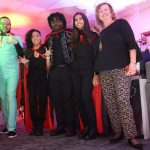
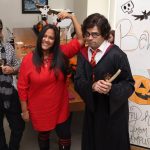
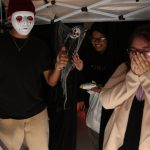
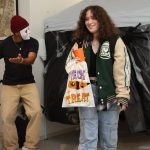
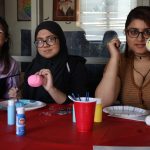
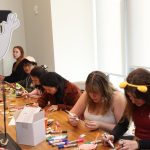
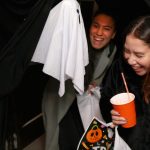

It was a new ambience for the Joseph M. McShane, S.J. Campus Center: eerie music, wolf howls, ghoulish costumes, giant cobwebs, a hallway-size haunted house, laughter mixed with the occasional frightful yelp.
The one flaw in the spookiness? All that natural light flooding in through the huge windows. “The sun is always shining in, it’s beautiful,” said Gabriel Chavarria, a Fordham College at Rose Hill senior passing through the Career Center and Campus Ministry areas.
The Haunted Open House marked a new effort to help fully integrate the McShane Center into University life by enticing students to wander the full length of the second floor, discovering the cavernous hallways and hangout areas along the way—as well as all the offices there to serve them.
The second floor’s Halloween-season transformation highlighted a much larger, permanent transformation of student life brought about by the campus center’s construction, a pillar of the University’s $350 million fundraising campaign, Cura Personalis | For Every Fordham Student.
Enhancing the Entire Student Experience
Construction on the campus center has continued since it opened to students last year. Amid the second-floor Halloween hijinks on Oct. 17, crews were working on the first-floor Marketplace renovation that will produce a vastly better dining experience in another nine months or so.
Unfinished as it is, the McShane Center already feels like students’ home. “This is such a huge resource, and I think it’s a real asset to the University,” said Isabella Guariniello, a junior at Fordham College at Rose Hill who found the haunted house to be “a really cool way to interact with the students and the faculty here.”
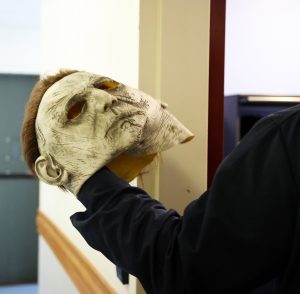
Commuter student Ryan Nole, a Gabelli School of Business junior, appreciates being able to hang out in the campus center between classes. He’s noticed that it’s brought new visibility to student clubs and organizations and provides a kind of social lubricant—“I know if I want to see someone, they’ll probably be here,” he said while checking out the open house. “It definitely fulfills its role as a community space.”
In fact, with so many students gravitating toward the new student lounge and communal spaces on the first floor, “we wanted another way for students to kind of say, ‘Hey, there’s more parts to the building, there’s a whole bunch of stuff up here,’” said Juan Carlos Matos, assistant vice president for student affairs for diversity and inclusion—dressed up for the occasion as “Dr. Acula.”
Students partook of Halloween candy—including the allergy-free kind—and activities like pumpkin painting. All of the second-floor offices got into the act, including Student Services, the Office for Student Involvement, and the Office of Multicultural Affairs.
‘Cathedral-Like’ Light
To be sure, the new campus center has already been boosting the work of second-floor offices including the Career Center, which gained a new suite equipped with 10 interview rooms, event space, and other amenities, including new capabilities to promote career-related events.
The new suite “has truly elevated our office University-wide,” said Annette McLaughlin, director of the Career Center. The 840 career counseling appointments held from July through September represent a 24 percent increase over the same period last year, she noted.
Campus Ministry and the Center for Community Engaged Learning, or CCEL, now share a roomy, inviting suite with floor-to-ceiling windows providing “cathedral-like” light, in the words of Campus Ministry administrator Carol Gibney. It offers plenty of room for students to study or hang out and unwind, making it more likely that they’ll learn about something they want to get involved in, said Amanda Caputo, FCRH ’23, a program manager with Global Outreach. “Students [have]made this their home, in a way,” she said.
By providing generous, dedicated space for CCEL’s meetings with its New York City partner organizations, the facility “demonstrates the University’s commitment to community engagement and experiential learning,” said the center’s executive director, Julie Gafney, Ph.D.
“It helps to show that this is what we mean when we say we’re a Catholic and Jesuit institution,” she said. “We mean that we create spaces that put our mission work first.”
Learn more about the McShane Campus Center renewal and opportunities to give in support of it.
]]>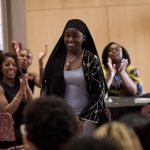
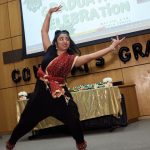
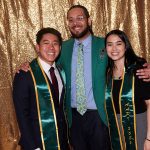
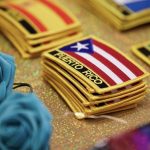
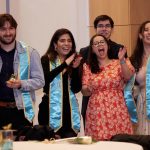
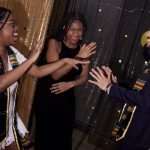

 Graduating seniors celebrated their heritage and culture at four diversity graduation ceremonies held from May 2 to 8.
Graduating seniors celebrated their heritage and culture at four diversity graduation ceremonies held from May 2 to 8.
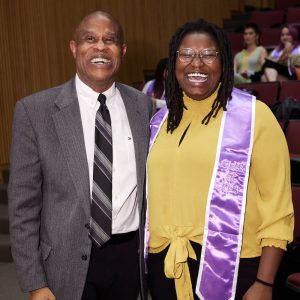
“We are so happy that you joined our community, that you brought your blazing talent to Fordham, and that you worked incredibly hard,” Tania Tetlow, president of Fordham, said in a video message to students. “All of it has led to this moment.”
In total, more than 200 students were recognized at the third annual Asian American and Pacific Islander, Black, Latine, and Lavender (LGBTQ+) graduations.
Si Se Puede: Yes You Can
The series of ceremonies began with the Latine graduation, which honored more than 80 students from both campuses. Each student was given an aqua blue stole, a color selected by students because it reminded them of the Caribbean. From a banquet table, they collected colorful patches stitched with the flags of Latin American countries, as well as stickers with slogans like “Si Se Puede,” which translates to “Yes You Can.” At the end of the evening, they ate empanadas, plantains, and rice and beans while listening to an eclectic group of Latinx artists that included Bad Bunny, Celia Cruz, and Rosalía.
Juan Carlos Matos, assistant vice president for student affairs for diversity and inclusion, set the scene for the Latine graduation.
“Tonight, let’s take in all of the joy in our ability to celebrate Latinidad in all its forms, from those born in Latin America, to those born in the States,” Matos said. “To those who are native Spanish speakers, to those who get along with their Spanglish … and everyone in between.”
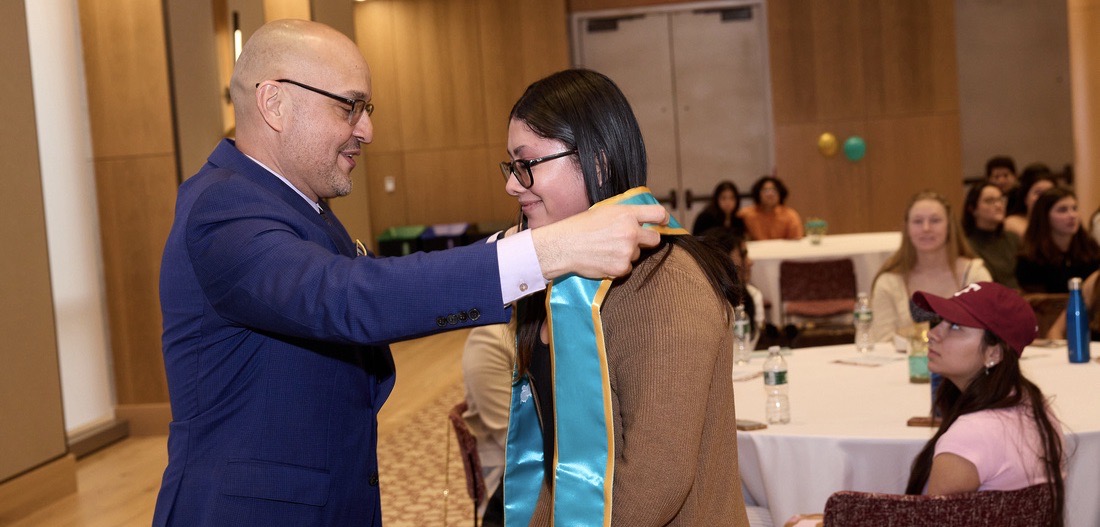
Finding A ‘Family’ at Fordham
In a heartfelt speech, student Maya Dominguez shared how her life changed after joining the Latine club at Rose Hill, El Grito De Lares, where she found a community of people who understood and embraced her culture.
“Finding a community where you can share your struggles, laughter, and success is finding a family,” said Dominguez, who earlier that evening won a Sonrisa Award, given to two graduating seniors who demonstrate dedication to Fordham’s Latinx community.
Arthur Ze An Liu, a senior who won the Lotus Award at the AAPI ceremony, said he found a similar community at Asian Cultural Exchange. He joined the student club during his first year at Fordham and rose in the ranks, from freshman representative, to treasurer, and finally president. He recalled their inaugural lunar year celebration, hosted by their club last year.
“We were able to bring one of the most significant cultural holidays for the Asian community to Fordham,” said Liu, who was born and raised in Hong Kong and is of Chinese descent. “I’m glad that I represented my heritage and happy to have seen other people interact with my culture.”
The celebrations, which were held at both the Lincoln Center and Rose Hill campuses, were sponsored by the Office of Multicultural Affairs, Office of the Chief Diversity Officer, Office of the President, and the 2023 Senior Week committees.
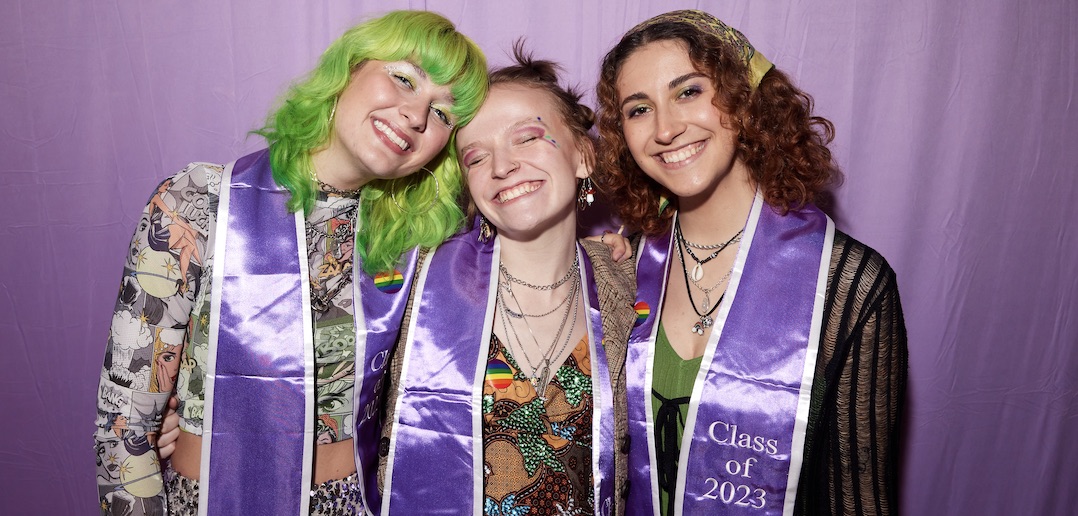
]]>Below are the award winners for each graduation:
AAPI Graduation:
- Lotus Leadership Award: Naimal Chisti (Lincoln Center) and Arthur Ze An Liu (Rose Hill)
- Most Likely to Sell Out a Lincoln Center Concert (Superlative Award): Liz Shim (Rose Hill)
- Most Likely to Start a Successful Youtube Channel (Superlative Award): Maleiya Lorenzo (Rose Hill)
- Most Likely to Survive the Last of Us (Superlative Award): Jonathan DeFelipe (Rose Hill)
- Most Likely to Open a Michelin-Star Restaurant (Superlative Award): Ishrat Soha (Lincoln Center)
Black Graduation:
- Black Leadership Award: Chanelle Dortch, Kiya Brown, Sophia Henderson (Lincoln Center) and Aminata Konateh, K.D. Spencer Roman, Alvin Feliz Varona (Rose Hill)
Latine Graduation:
- Sonrisa Award: Annabel Filpo (Lincoln Center) and Maya Dominguez (Rose Hill)
- Pa’Lante Award: Daniella Lopez (Lincoln Center) and Alexander Chavez Sanchez (Rose Hill)
Lavender Graduation:
- George Takei Arts and Media Award: Adah Unachukwu (Lincoln Center) and Chloe McGee (Rose Hill)
- Marsha P. Johnson and Sylvia Rivera LGBTQ+ Activism Award: Trystan Edwards (Lincoln Center) and Santiago Plaza (Rose Hill)
- Audre Lorde LGBTQ+ Research Award: Caridad Kinsella (Lincoln Center) and Benedict Reilly, Lillian Gieseke, Ethan Hammett (Rose Hill)
- Fr. Bryan N. Massingale Faculty LGBTQ+ Award: Karina Hogan (Lincoln Center) and Jennifer Moorman, Ph.D. (Rose Hill)
In an online conversation on June 16, Westenley (Wes) Alcenat, Ph.D., an assistant professor of history, urban, American, and African American studies at Fordham, and Rafael Zapata, Fordham’s chief diversity officer, discussed how the two events are tied to each other.
“You have this classic example of hundreds of thousands of people who were free in Texas but would remain unfree for another two years because the news was suppressed,” Alcenat said.
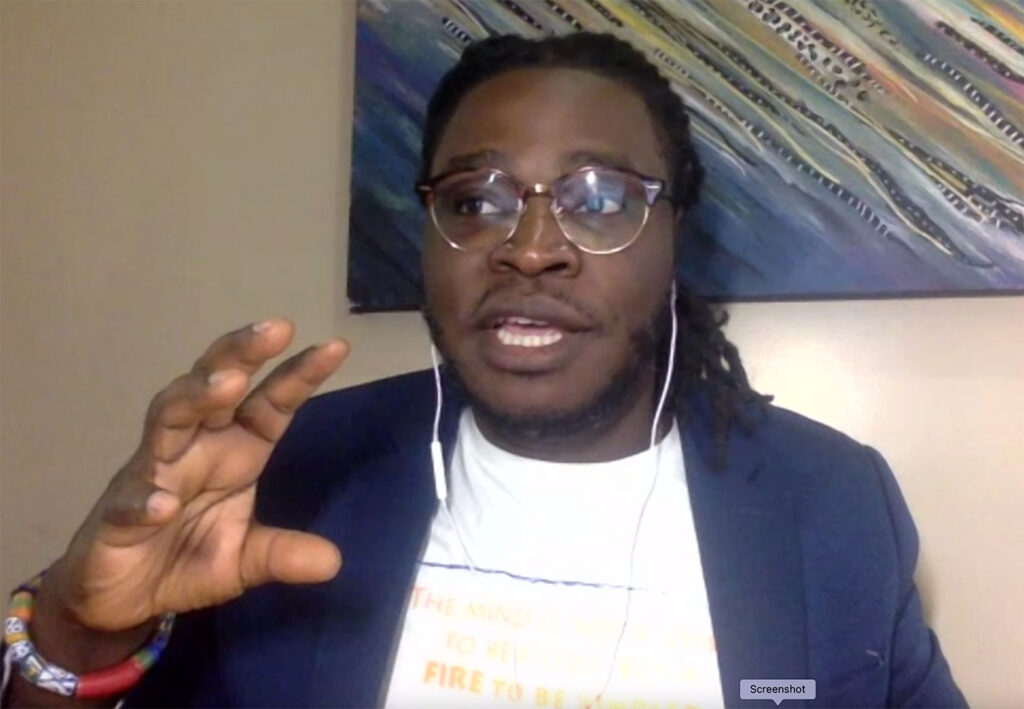
Just as the news of the Emancipation Proclamation took years to reach enslaved people in Texas, the news of the Haitian revolution—and the French Revolution—took years to reach Black men and women who might have been emboldened by such victories.
“If you go back to 1791, not only were words of the French Revolution being suppressed among the enslaved population in Saint-Domingue (as it was known back then) but news of the Haitian revolution, which lasted over a decade, was suppressed among the free Black and enslaved population here in the United States,” he said.
When the Haitian people finally won their independence from France in 1804, it also had unexpected consequences for the United States, he said. In a sense, it was both a gift and a curse for Black and indigenous people.
“It’s a gift in the sense that, nowhere else had this ever taken place before in human history—enslaved people rebelling and fomenting a revolution that established a state,” he said.
“At the same time, with the loss of Saint-Domingue as such a productive colony, France all of a sudden found itself without the funds to continue its many continental wars, so it turned over the Louisiana territory to the United States, which doubled the size. So, the domestic slave economy in the U.S. expanded very fast.”
Victory also brought serious hardships to the new Haitian nation, as the French would demand punitive reparations for its “loss of assets.” A recent New York Times investigative series, The Ransom, showed how two centuries of debt and dependency would follow.
While Haiti is still to this day struggling to thrive as a nation, Alcenat, a Haitian native, said that the principles guiding its founding can be found in the spirit of today’s Black Lives Matter movement.
When the country was formed, “Haitian constitutionalism,” as he dubbed it, granted citizenship to anyone who was indigenous or of African descent. Most of the indigenous inhabitants had been massacred by Christopher Columbus, but the move symbolically restored dignity to those who claimed the land first. Even the name of the new country, Haiti, which means “island of mountains,” was the name the indigenous inhabitants had chosen for the island.
“It’s not reparations in the conventional wisdom, but as a returning of dignity to that to whom it belonged and humanizing the indigenous folks whose land this was in the first place, and in the process, claiming for themselves a new form of indigenity,” he said.
What really connects the Haitian constitutionalism to Black Lives Matter was the principle that said that for someone to become a Haitian, they first had to declare themselves Black. Under the new post-revolution laws, white males were explicitly banned from owning land and property.
“This is the precedent to the Black Lives Matter, because what it’s saying is, the degraded, the dehumanized, the oppressed, those who are at the very bottom of society, we are going to reverse the order. They really do know what freedom is because they also know what non-freedom looks like,” he said.
“There are historians who very much want to argue that this was reverse racism, and excuse my French, but that is pure B.S. It had little to do with whiteness because in fact, white men could become Haitian. All they would have to do is say, ‘I declare myself Black,’” Alcenat said.
It wasn’t an abstract concept either, as he noted that during the war, 400 to 500 Polish soldiers who had been sent by Napoleon to reclaim the island and reimpose slavery defected from the French army and stayed on the island permanently. Their descendants can be found there to this day.
“In order to incorporate them into this new revolutionary society, the Haitians had to find a way to assert the principle of Black freedom, but not have that principle restricted by race,” he said.
“So Black freedom is, in a sense, the most capacious, most expansive form of freedom that was allowed.”
Zapata noted that although this was the third time the University had honored Juneteenth, this was the first event that connected it to research on Black liberation.
“The Haitian revolution was always an important piece to the notions of freedom,” he said.
“I can think of no better way to honor Juneteenth than to honor our outstanding faculty whose research is so close to this work”
The conversation was sponsored by the Office of the Chief Diversity Officer, the Office of Multicultural Affairs, and the Office of the Provost.
]]>
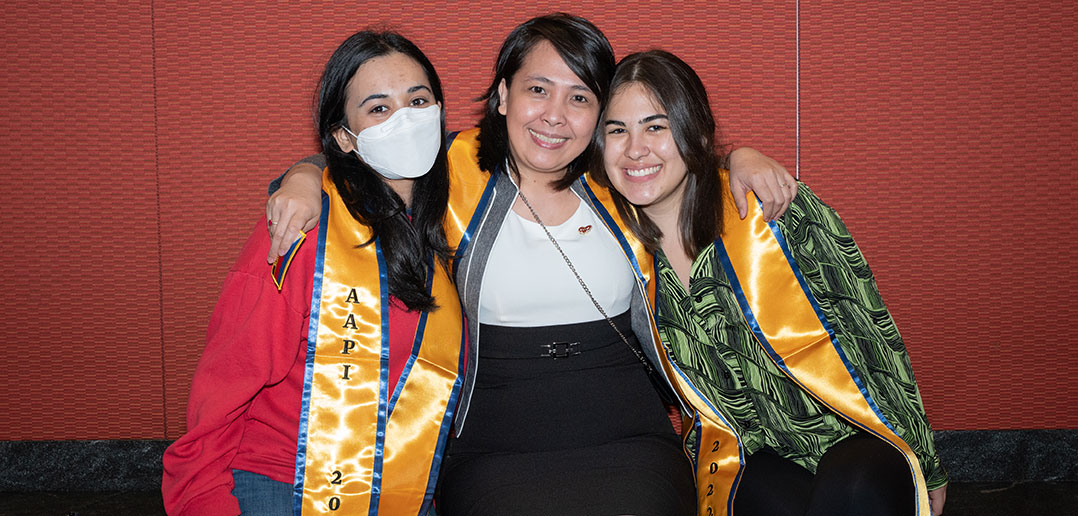
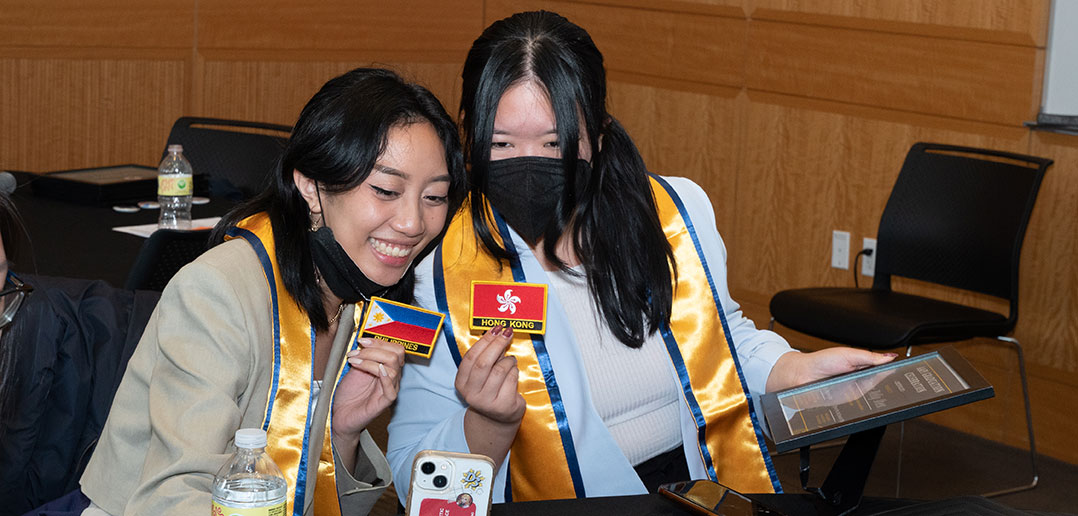
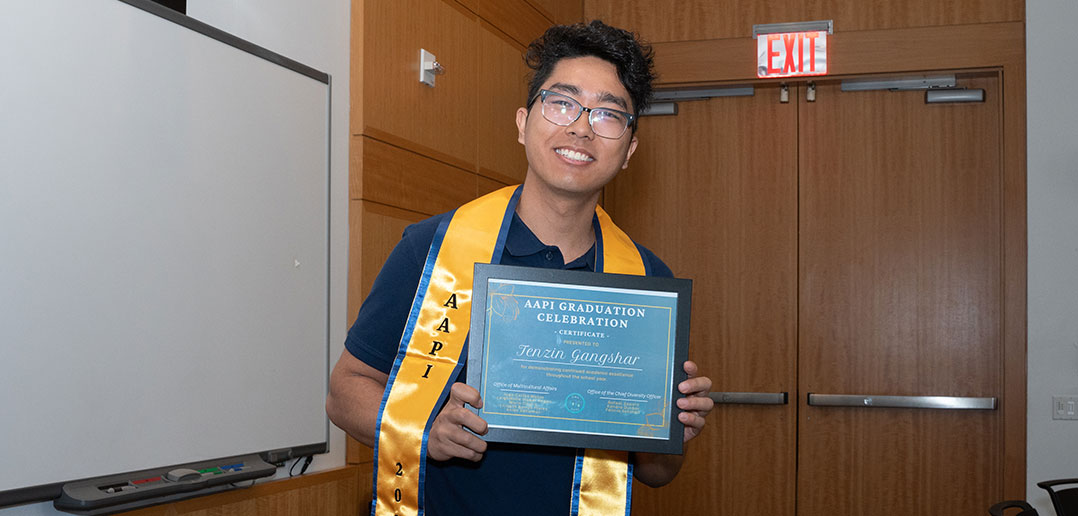
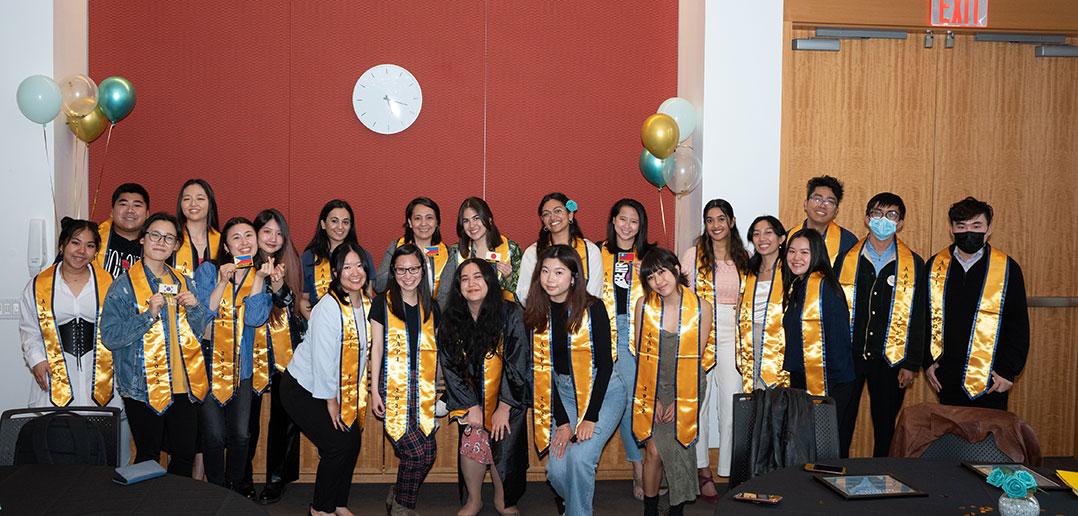
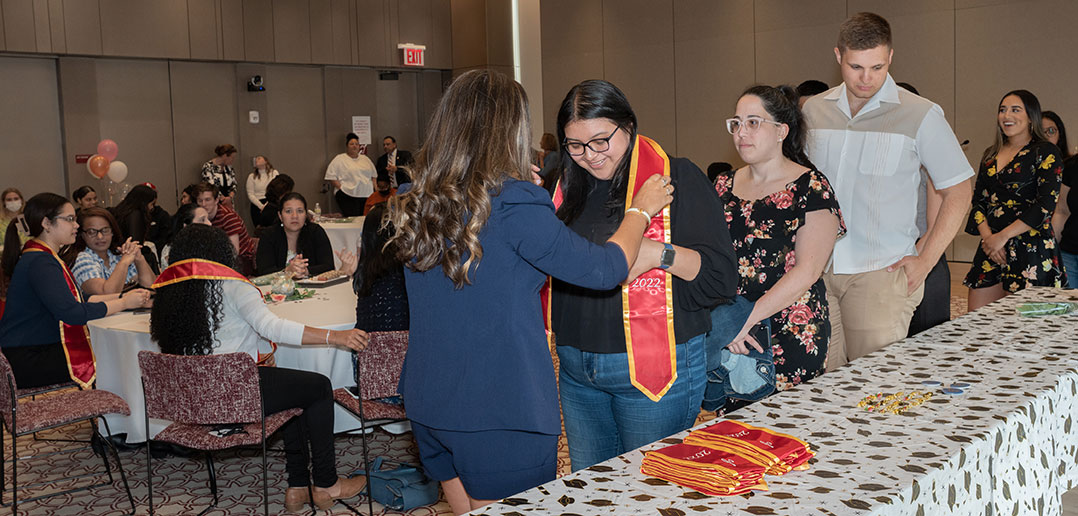
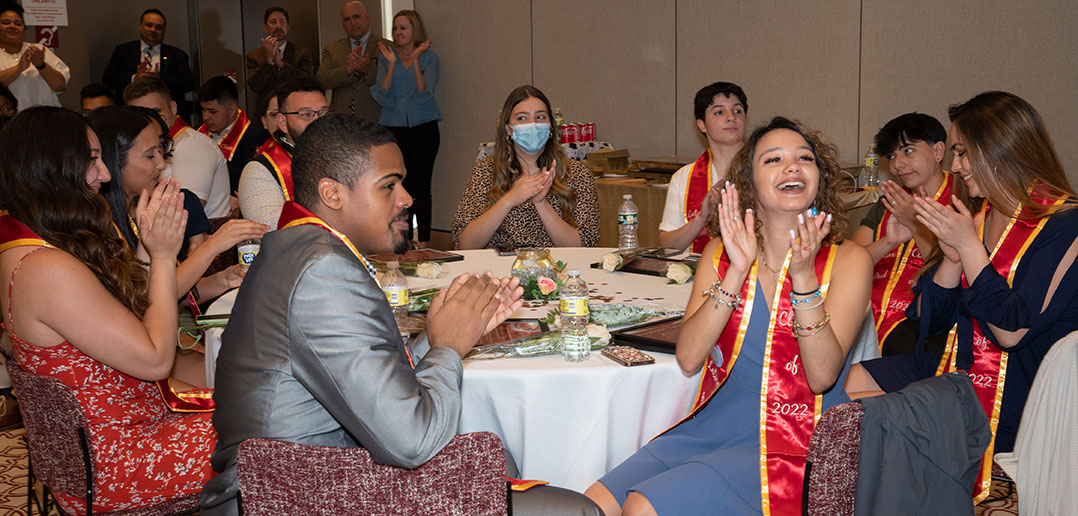
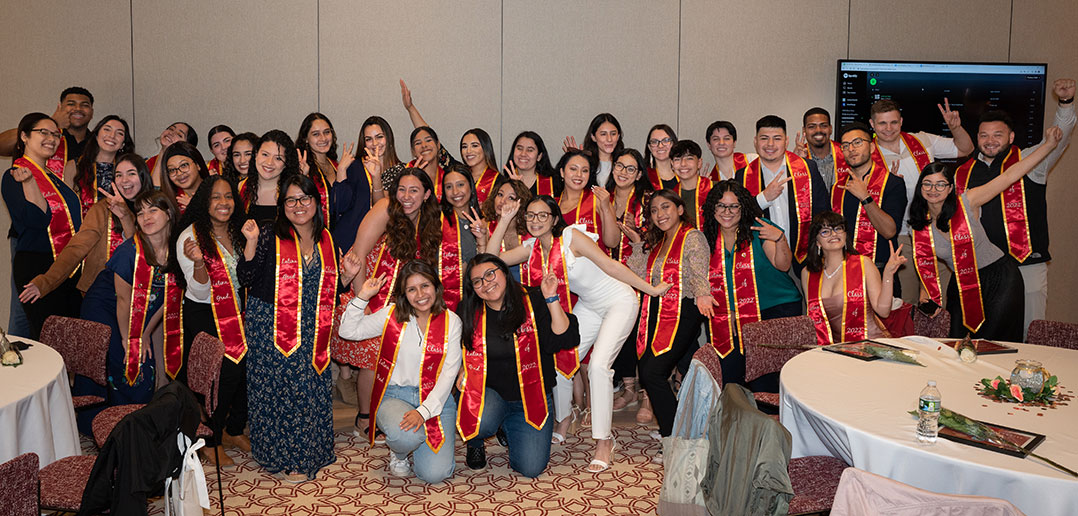
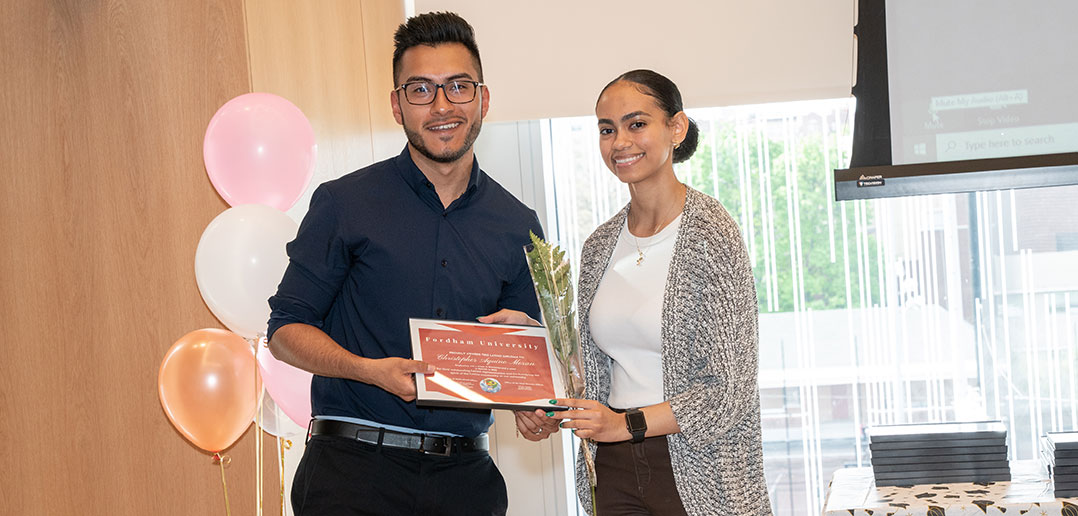
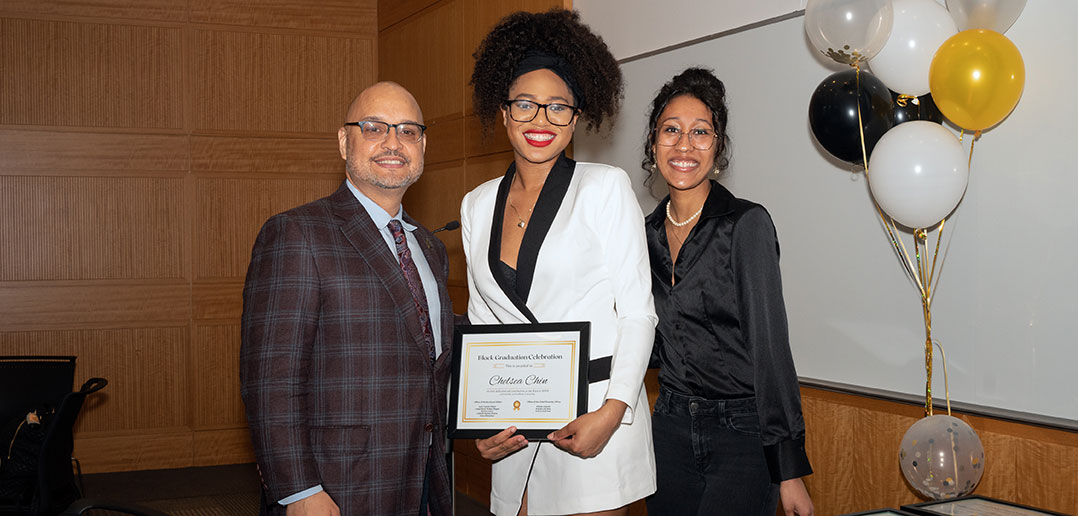
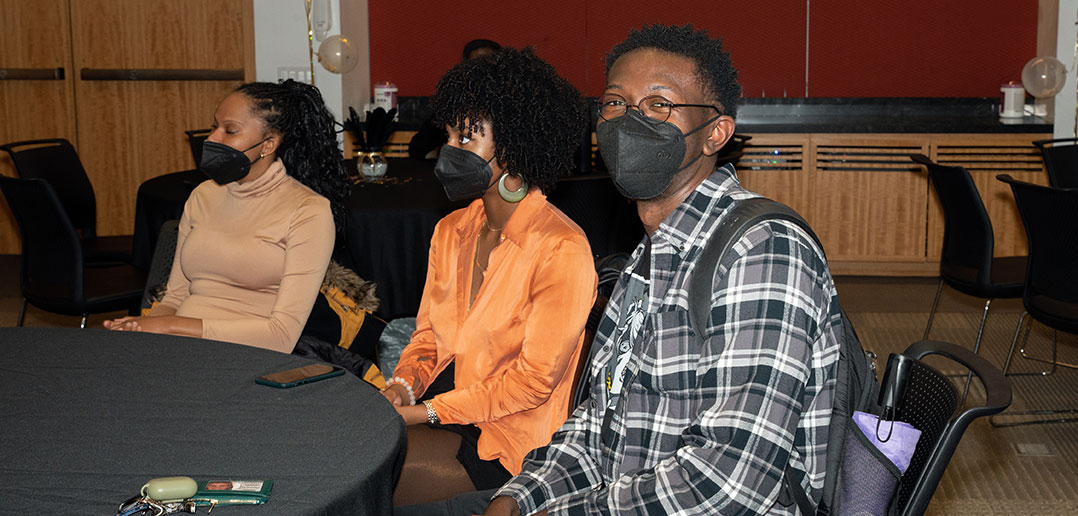
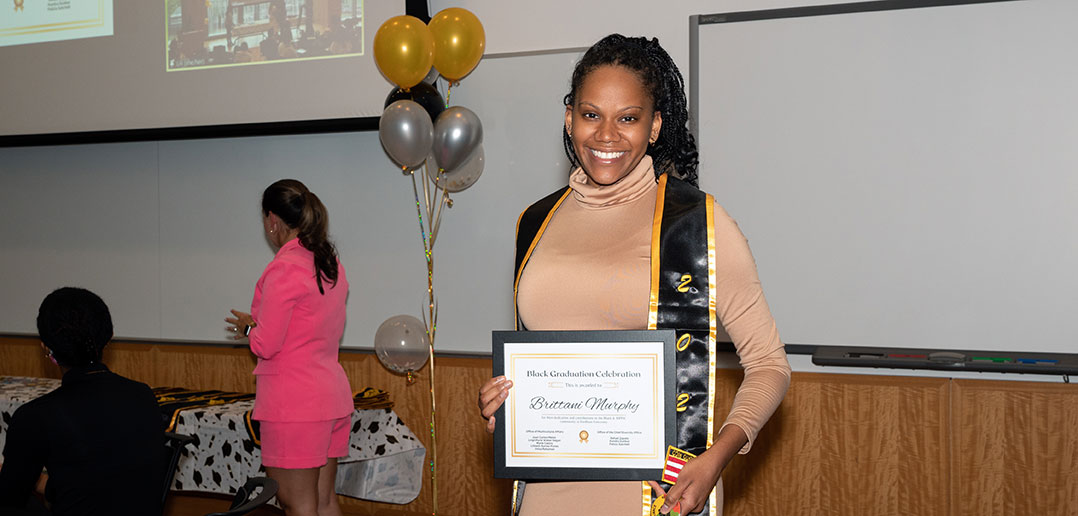
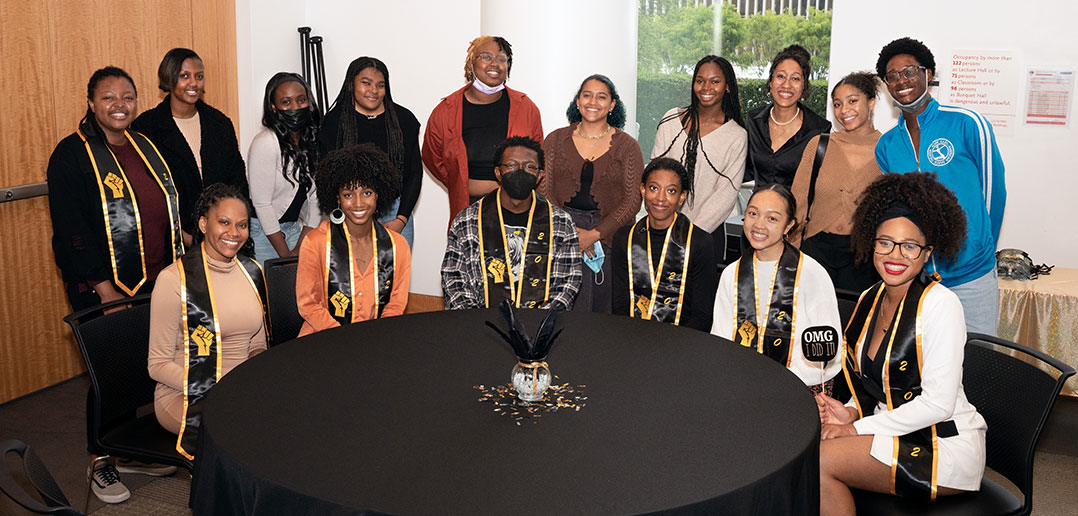
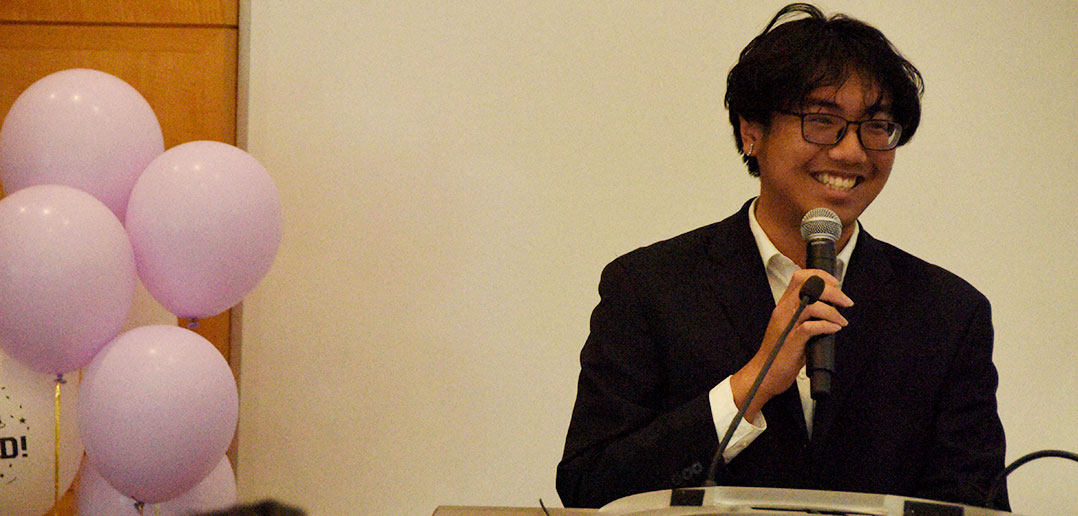
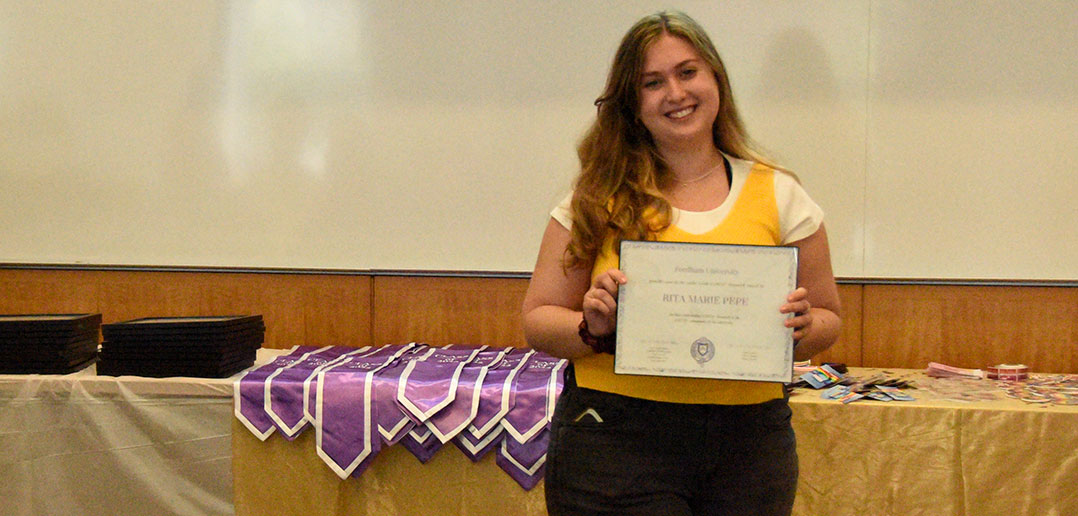
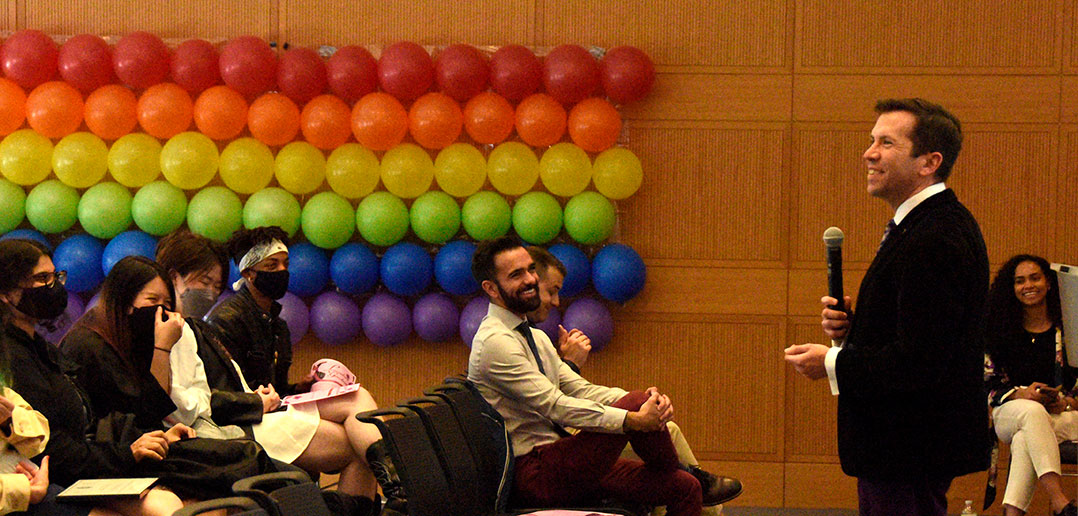 Dozens of senior students celebrated at Diversity Graduation ceremonies in early May, toasting to their accomplishments while honoring their culture and identity.
Dozens of senior students celebrated at Diversity Graduation ceremonies in early May, toasting to their accomplishments while honoring their culture and identity.
The celebrations took place from May 2–6 at the Rose Hill and Lincoln Center campuses, honoring students from the Black, Latinx, LGBTQ, and Asian American and Pacific Islander (AAPI) communities. Seniors received colored stoles, certificates, and other items that symbolized their identity.
Juan Carlos Matos, assistant vice president for student affairs for diversity and inclusion, said the events drew a lot of excitement this year, with students buzzing about the celebrations beforehand and younger classmates leading the planning process.
“I think being able to create a tradition that folks look forward to and a culminating experience that connects back to people’s identity and culture is an important thing for the Fordham community,” he said.
Dorothy Bogen is a Fordham College of Rose Hill sophomore who served as a programming coordinator for the LGBTQ History Month committee of the Office of Multicultural Affairs, which ran the Diversity Graduations.
In her role she also led the planning for other events, including the Lavender graduation ceremony for LGBTQ seniors, which featured an appearance from theology Professor Patrick Hornbeck, Ph.D.
“Professor Hornbeck gave an inspiring speech (even with a fire drill interruption!) and it was awesome to feel the joy and the energy in the room as students were called up to receive their stoles,” said Bogen, an American Studies and Film and Television major from Cleveland. “We also got to connect with the Rainbow Rams (the alumni group for Fordham LGBTQ graduates), and their representatives also gave great speeches on both campuses.”
Arianna Chen, a Fordham College at Rose Hill senior from Wayne, New Jersey, attended the AAPI ceremony. She said she was grateful that the Office of Multicultural Affairs hosted these events and took the time to “acknowledge and celebrate the unique experiences held by students of varying identities.”
“It was important for me to participate in the Diversity Graduation ceremony because my identity has been a key part of my Fordham experience, not only as a DEI student activist, but also just a student of color navigating a predominantly white institution,” she said.
Chen received an AAPI stole and ACE (Asian Cultural Exchange) pin that she said she is “so looking forward to proudly donning at [her]Commencement ceremony.”
Matos said there was a “mix of support, love, and joy” at the events, each of which featured a recorded greeting from Joseph M. McShane, S.J., president of Fordham.
“Students being able to celebrate with their peers and be celebrated was a huge deal,” he said.
]]>“The whole concept of sexuality was confusing. I chose to repress the subject rather than confront it,” he wrote in a memoir that he completed in 2017, the year before he died.
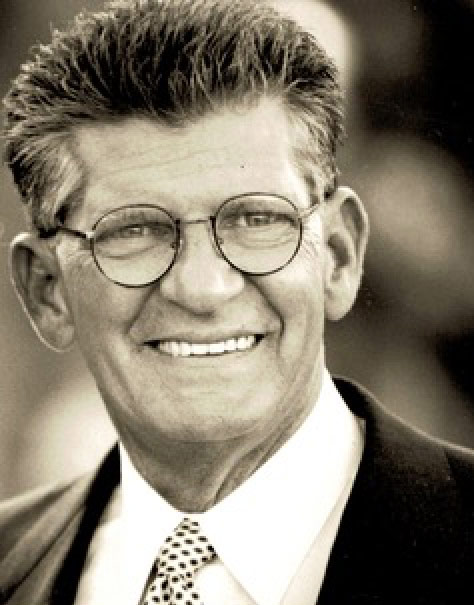
As he worked to overcome fear and secrecy about his own homosexuality, he wanted to help others do the same. This intention fueled his desire to write his memoir, not yet published. And it motivated him, in one of the final acts of his life, to make a gift to advance the cause of inclusivity and tolerance across all lines of difference.
With a bequest of $200,000, Esposito created the first endowment for Fordham’s Office of Multicultural Affairs, a fund that is now poised to bear fruit for the office’s programming. The funding arrives, in fact, in the midst of a Fordham fundraising campaign, Cura Personalis | For Every Fordham Student, that has diversity, equity, and inclusion at its heart.
“He would be so proud to be part of this campaign,” said Jackie Comesanas, senior director of gift planning in Development and University Relations at Fordham, who worked with Esposito on setting up his gift. Esposito wanted to make a diversity-related gift focused on the Bronx and Fordham, of which he had fond memories, she said.
In the Struggle
A Brooklyn native, Esposito worked in hotels and catering during his time at Fordham and went on to become a hotel casino executive and entrepreneur.
He served as vice president of sales for Fairmont Hotels, vice president of MGM Reno, and president of Bally’s Las Vegas, among many other roles. In 1988, he founded the successful sales and marketing consultancy Hotel Management International.
He was a driven executive, at times “over the top” in motivating his staff, he wrote in his memoir, My Name is Joe: The Journey of a Gay Recovering Alcoholic in the Casino Industry.
He was also a talented salesman whose strength was his authenticity, said Robert Benz, a longtime friend and former business partner of Esposito’s. “Being real and being himself was what made him a great salesman,” he said.
But Esposito also felt shame at not being more forthright about his sexuality. Was He gained clarity about his sexual orientation in his early 20s but still “compartmentalized” it and avoided the topic, he wrote in his memoir. He wrote of spending time with three nephews during their youth and young adulthood, traveling around the U.S. and Europe, but never discussing his sexuality with them until he had reached middle age.
“Here I was, now in my early forties, telling these guys in their twenties that I was gay,” he wrote.
One of them responded by saying “‘How could you spend so much time with me and hide who you are?’ I gave the standard answer that, “‘Being gay is not who I am,’” he wrote. And—“I asked him why he did not tell me that he was straight.” (Later on, he said, “it was fun being his gay uncle.”)
Esposito said he met many heterosexual people who stood up to anti-gay bigotry. But hate reared its head often. There was a day in 1980, at the MGM Reno, when his secretary came back from lunch and seemed to be hiding herself a bit. He walked around her desk and saw a red mark on her face.
“I do not know to this day how I knew that Maria had defended me,” he wrote. He responded with some gentle humor, telling her they couldn’t get into a fight with everyone that called him a name—“If we did, then we would both be fighting a lot with our 2,500 employees and neither one of us would get any work done.”

In 1984, he co-chaired the Las Vegas Task Force on AIDS with then-governor Grant Sawyer. The AIDS epidemic claimed the life of one of Esposito’s best friends, someone whose family hadn’t known he was gay. At a gathering following the funeral, Esposito wrote, “the gay people were on one side of the room, the family on the other, and a giant division in between,” as the family reeled from both the loss of their son and what they hadn’t known about him.
“My generation often kept our private lives hidden from family. It was wrong for us to do whether they accepted us or not,” he wrote. “It took away from our personal dignity.”
Esposito did his part to help people shed secrecy and fear about their orientation, said his husband, Edgar Esposito, whom he wed in Las Vegas in 2015.
“He was a person who wanted everybody to be happy, and just help as much as he could to make sure that those who are gay and in the closet a little bit make their way out in a much easier way,” Edgar said. “One of his nephews has a gay son, and the nephew came to him to talk about his son, and he kind of helped the nephew understand that acceptance is a very powerful thing, especially when it comes to your child.”
Alcoholics Anonymous
Sobriety, supported by the spiritual aspect of Alcoholics Anonymous, was an anchor of Esposito’s life. He turned to AA at age 30 to deal with “blackout” drinking rooted in childhood fears, inner emptiness, and the stresses related to being gay in a world that was not always tolerant. “Many people in my generation were fearful” about their sexual orientation, he wrote.
When he walked into his first AA meeting, “it was like I met people from my planet for the first time.”
Forty-six years of sobriety, he wrote, “is the most important accomplishment of my life.”
Esposito struggled with cancer toward the end of his life; he died on March 4, 2018, at the age of 76, within a year of signing the agreement to create an endowment at Fordham.
Impact of the Endowment
The Joseph E. Esposito Jr., FCRH ’63, Endowed Fund will help the Office of Multicultural Affairs expand its various efforts to foster cross-cultural competencies, engagement of diverse students, and a more welcoming and inclusive atmosphere, said Juan Carlos Matos, assistant vice president for student affairs for diversity and inclusion.
“Now we can reimagine things in ways that we couldn’t before,” Matos said. He plans to manage the funding for the greatest possible long-term impact. “I feel like there’s an obligation to make sure we’re spending any funds in an intentional way,” he said.
The endowment could help send students to diversity-related conferences or bring speakers to campus, for instance; it could also give the office’s student-run cultural committees latitude to come up with more on-campus programs and events.
With more events comes more student involvement, in a kind of “domino effect,” Matos said.
“Once you’re able to do some larger-scale programs that have an impact … you’ll naturally then have more students that are aware of either what the office does or ways to get connected, and then those students then join the committees and want to continue doing that work.”
The endowment could be used to sustain one-time events that drew a strong response from students, like the block party held at the Rose Hill campus during Welcome Week this past fall or the diversity graduation celebrations held last spring.
The celebrations for Black, Latinx, and LGBTQ students and students of Asian or Pacific Islander descent were held in conjunction with the Office of the Chief Diversity Officer, using funds that been freed up by the scaling down of in-person events during the pandemic lockdown of 2020-2021, Matos said.
The Esposito fund “allows us a level of sustainability for these really important events that we hope become markers of students’ experience here at Fordham,” he said. “The more you’re able to provide these experiences … that people look forward to, that increases a sense of belonging.”
Learn more about Cura Personalis | For Every Fordham Student and make a gift.
If you have a question about giving to Fordham, call 212-636-6550 or send an email to [email protected].
]]>Fordham’s annual Native American Festival returned to Rose Hill with in-person performances on Saturday, Nov. 20.
The festival, which was first held in 2017, took place at the McGinley Center Ballroom. It featured dancing, singing, and storytelling from the group the Thunderbirds, whose members represent several different indigenous tribes around the world. The musician Heno Josephine also performed.
Chanelle Dortch, a junior at Fordham College at Lincoln Center who helped organize the event, said that her knowledge of Native America communities had expanded dramatically in her time at Fordham, thanks to her involvement with the Office of Multicultural Affairs, which sponsored the event.
“I was just really happy to be here in person, and to actually see it live, because that’s not something I’ve experienced before,” she said.
“There is so much that is either forgotten or glazed over, especially in such rich communities like the native and indigenous communities across the world. It’s important to go back and say, ‘This is important work; these are things that need to be known, and we need to celebrate all these communities that have suffered harm.”
]]>Academic Affairs/Office of the Chief Diversity Officer (CDO)
With funding from the dean of the Faculty of Arts and Sciences and the Office of the CDO, this academic year we enthusiastically welcome sociologist Daniela Pila, Ph.D., our inaugural Postdoctoral Fellow in Critical Race Studies, in the Department of Sociology and Anthropology. Pila’s research and teaching focus on race, ethnicity, immigration, and the law, with a focus on the experiences of Filipino immigrants in the greater New York City area.
The Office of the CDO has awarded 22 mini-grants across more than 20 departments for exploring ways to integrate questions of race into their introductory and major/minor courses as part of the Teaching Race Across the Curriculum grant program, launched last spring.
In August 2021, during the annual planning retreat, the University Deans Council— which includes the deans of all of the schools, the Provost, and other academic leadership—participated in a Racial Justice Examen, connecting the work of racial justice to the goals of the division for the coming year.
This summer, Chief Diversity Officer Rafael Zapata helped create and facilitate a series of mission-based racial justice workshops for about 50 participants of Cohort 14 of the Ignatian Colleagues Program (ICP) held at Loyola University Chicago’s Retreat and Ecology Campus, focusing on the Racial Justice Examen created last year by a group of mission officers and chief diversity officers of the Association of Jesuit Colleges and Universities (AJCU) network.
Building on the success of these workshops, the Office of the CDO will be piloting a series of mission-based community building/racial justice workshops adapted to Fordham students, faculty, and staff. The four workshops (roughly 2.5 hours each) are based on foundational Ignatian concepts and designed to foster action. They are titled: Building Community Toward Racial Justice, Developing Discerning Leadership in Service of Racial Justice, Discerning Leaders in Action, and Eyes to See: Committing to the Work of Racial Justice.
Office of Undergraduate Admission
In August, Fordham welcomed the most diverse class it has ever had—and also its largest ever, with more than 2,800 students. The Class of 2025 has more than 44% domestic students of color. The new Rams hailed from 45 states, 51 countries, and all five boroughs of New York City. More than 600 students in the incoming class are from New York City, including more than 160 from the Bronx—up significantly from last year. Finalized admissions numbers are as follows:
- Hispanic 18%
- Asian 14%
- Black 7%
- International 6%
- Unknown <1%
- American Indian/Alaska Native <1%
- Pacific Islander <1%
- Two + 4.5%
- White 49%
As the office continues its hiring process for a new associate director of admission for diversity initiatives, Ike Uche has recently been promoted to senior assistant director and will be working on many of our DEI-related initiatives.
Fordham School of Law
In August, Fordham Law School launched its Realizing Excellence and Access in the Law (REAL) program to expand opportunities for first-year law students from historically underrepresented backgrounds, including underrepresented racial, ethnic, geographic, socioeconomic, LGBTQ, and first-generation college student backgrounds.
REAL will orient students to the study of law and help new first-year law students feel prepared, confident, and welcome in the Fordham Law community. It provides a pre-orientation program consisting of classes that introduce students to the foundation of law and focus on the basics of legal reasoning and analysis and fundamental legal concepts.
There is a wellness component to the program, which includes peak performance sessions to manage the personal aspects of navigating law school. Participants will also learn useful information from peer mentors during the program.
“The practice of law and our law school community benefit when students from all backgrounds are provided a real opportunity to succeed,” said Kamille Dean, Esq., director of diversity, equity, and inclusion at Fordham Law. “We find that prospective lawyers thrive when they learn the skills they need from individuals with shared experience, and that’s what drives our new program.”
Student Affairs
New Student Orientation hosted a number of enhanced, annual programs for incoming students, including multicultural receptions for students and families, a reception and mixer for LGBTQ students, a presentation and video from the Office of Multicultural Affairs, DEI speaker Mohammed Soriano-Bilal from Stanford University, and DEI-focused small-group conversations facilitated by orientation leaders.
These conversations continued after orientation through the mandatory Civility Core Program for new students, in which students explore a number of DEI concepts and terms and receive an overview of the University’s bias policy and how to report a bias incident. Survey results indicated that 84% of students agreed, or agreed strongly, that the presentation was interactive and engaging.
The Office of Multicultural Affairs hosted its first OMA Block Party at the Rose Hill campus with various cultural clubs and committees advised by the office, followed by BIPOC student mixers at both Rose Hill and Lincoln Center.
The Office of Residential Life has continued to see progress in increasing the diversity of the resident assistants (RAs) and resident first-year mentors (RFMs). The percentages below represent the racial and ethnic breakdown by campus (identity categories differ by campus) for 2021-2022:
- Lincoln Center total number of RAs and RFMs: 42
- Asian 26%, Black 14%, Hispanic/Latinx 10%, White 29%, Mixed Race 21%, Total BIPOC 71%
- Rose Hill total number of RAs: 95
- Asian 12%, Black, Afro-Caribbean, or African American 21%, Hispanic/Latin/Latinx 19%, White 48%, Total BIPOC 52%
Office of Alumni Relations
Alumni Relations held its MOSAIC (Multicultural Organization Supporting Alumni Initiatives and Community) fall networking event on September 30 at the Princeton Club in New York City. MOSAIC supports the inclusion and engagement of diverse Fordham community members in the life of the University—it is the premier annual event for alumni of color.
Recent Fordham DEI News
Fordham CSTEP: A Home for First-Generation College Students
STEPping into Biology with Hip-Hop
Fordham Welcomes First Diversity Fund Aid Recipients
Fordham Welcomes Most Diverse, Largest Class in History
Fordham STEP Receives ‘2021 Inspiring Programs in STEM’ Award
Dean of Students Jenifer Campbell on Holistic Care for All Students on Campus
]]>Like most Black indigenous people of color communities throughout the nation, many of the event’s participants have been disproportionately affected by the pandemic. In addition, the community is coping with a rash of violence against native women that has not received widespread national attention. Kevin Tarrant, founder of Silvercloud Singers, the inter-tribal group who had performed as host drummers at the past three festivals, died of COVID-19 in May. And Sheldon Raymore, who performed last year and was set to perform this year, pulled out because he was mourning the death of his cousin who was killed in October.
“Native people have a lot of experience of pandemics: 90% had died within 200 years after Columbus arrived with European smallpox. It’s amazing so many of us are alive today; now [a pandemic]is affecting us again,” said Bobby Gonzalez, the Bronx community organizer who liaises each year with OMA to help organize the festival.
Gonzalez, who is Taíno by way of Puerto Rico, provided historical context for the event in a talk titled “American History Through Native Eyes,” which he described as “500 years in 15 minutes.” In his speech, Gonzalez drew a connection between “man camps,” makeshift housing for nonnative pipeline workers, and women disappearing from reservations.
“These camps are all men, we call them “man camps,” he said. “Thousands of native women have been kidnapped, sexually abused, and murdered and very few people have been convicted because it was difficult on a reservation for natives to arrest nonnatives. Federal laws have stipulated that the federal government has jurisdiction, and it wasn’t a priority until only this past September when Congress passed the Savanna’s Act and the Not Invisible Act.”
Gonzalez’s talk outlined many atrocities perpetrated against native peoples, but he ended his talk stressing their resilience, noting the more than 2.7 million living in the U.S.; over 1.5 million in Canada; and 50 million in Central America, South America, and the Caribbean.
“We survived pandemics, we survived catastrophes, and we’re still here,” he said.
He attributed recent strides to finding common purpose with the Black Lives Matter movement as well as the LGBTQI community and “other suppressed peoples.”
The notion of strength and solidarity in community was underscored in dance, song, and stories performed by Ty Defoe, the Grammy-winning performance artist and activist who broadcast from his apartment in Brooklyn. Defoe grew up in the Ojibwe and Oneida traditions and identifies as two-spirit, a term used to describe gender fluidity.
Defoe performed a hoop dance in conjunction with a story about a native youth whose brothers and sisters were fighting. The youth was gifted a hoop by a god, who told the youth to make as many things in nature as they could and their people would become stronger each year, providing peace and resistance. The young person gathered red willow that grew by the river to make the hoops.
“You can still see this red willow over by the Hudson and the East River, it’s very flexible so you can make these circular shaped objects,” he said.
The youth danced with the hoop, the story goes, and made trees, flowers, animals, and butterflies.
“They did that dance and went back to their village and there were their brothers and sisters fighting with their fists in the air and when the dancer came with all of those hoops around them, the brothers and sisters stopped and dropped their fists in midair and said, ‘Holee wah!’ Holy Cow! Let me try that dance.”
That is how they formed what is now known as the people’s hoop dance.
“It is said that no matter who you are, no matter what race, tribe, religion sexual orientation, gender, age—no matter who you are you are part of this hoop, a part of this sacred circle.”

On that sunny autumn day, a crane lifted into place the final steel beam that forms the frame of the 71,000 square foot, three-story addition in front of the McGinley Center that will be part of Fordham’s new campus center.
It was unlike any of the 499 beams installed before it; before it was hoisted up and welded in place, students were invited to grab a Sharpie and adorn it with their signatures.
It was fitting that students should make their mark, as the student body will be at the heart of the new center. Opening in three phases beginning in September 2021, the center will feature several amenities-filled spaces that will work together to enhance the overall student experience on campus.
A Place to Get in Shape
The addition will be the first section to open. The first floor of that building will feature a state-of-the-art 20,000-square-foot fitness center open to all students, faculty, and staff, while the ground floor will feature a 9,500 square foot student lounge.
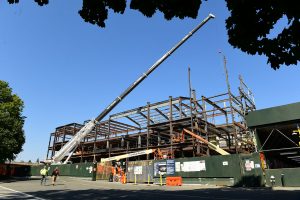
Photo by Chris Taggart
The second floor will be home to the offices of campus ministries and community-engaged learning, while the third floor will feature a special events space that can be used for large meetings and events, along with an 80-seat multi-purpose conference room.
After the new building addition is connected to McGinley by a Gallery in the first phase of construction, a second phase will commence by building an Arcade that will connect the Rose Hill Gym, Lombardi and McGinley Center together.
During the third phase of construction, the new fitness center will be connected with the adjacent space in the lower level of the McGinley. That area will be the home of a separate new strength and conditioning center dedicated to Fordham Athletics, which will not be completed until 2023 when the current McGinley center is fully renovated. But until then, athletes can take advantage of the new fitness center that will be open to all.
A Sleek Fitness Facility with Yoga, Spin Classes, and More
At 20,000 square feet, the new fitness center will be double the size of the current space, and a second studio space will accommodate groups interested in activities such as yoga or spin classes. Sleek finishes and exposed ceilings will give the space an urban, minimalist feel and call to mind exercise chains such as Equinox.

Ed Kull, interim director of athletics, said that since the expanded fitness area will be open to everyone on campus, “it will benefit the hundreds of students who play in club and intramural sports.” And he looks forward to the next-phase opening of the new varsity strength and conditioning area, which will support and train all 535 students participating in varsity team sports.
“It’s exciting because the varsity center will benefit all varsity female and male programs and athletes, and focus on their physical development, health, and wellness,” he said.
Zachary Davis, a senior history major at Fordham College at Rose Hill and a running back for the football team, thinks both the fitness center and the strengthening and conditioning center will have a big impact on student-athletes. The fitness center, he said, will be a place to get extra workouts in on top of regular practices. And although he will have graduated by the time the strengthening and conditioning area is open, he said the extra space will make a significant difference for future teams. Before the pandemic altered practice schedules, the team had to do its weightlifting in two shifts.

“Instead of having to be broken into different groups, the team will be able to lift and train as one unit, which I think would be revolutionary for the program. It’s always good to be with the guys and have the whole team in one setting,” he said.
“We currently have conditioning outside on the field with the whole group, and that’s always high energy. Guys are just pushing each other, and there’s a whole-team vibe in a way that is second to none.”
A Career Center with Cura Personalis Built In
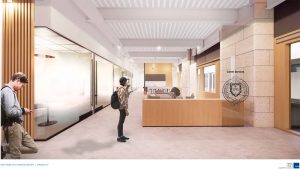
When career services director Annette McLaughlin learned that her office would be getting a new space in the first phase of the campus center expansion, she was well-prepared to make design suggestions. Seven years ago, she started visiting college campuses with her son and daughter; she estimated she’s seen career service centers at 40 campuses since then. The trend, she noticed, was space that was open, airy, light, inviting, welcoming, and educational, and that’s what Fordham is embracing as well.
“We want it to be a destination, not a checklist for students,” she said. “I want to create a career center for cura personalis. This is all about mind, body, and spirit as it relates to how you find your pathway in the world.”
The new center will feature a spacious lounge, McLaughlin said. Everything is being designed to be flexible and adaptable to different uses, from meet and greets to interviews and meetings. Adjoining interview rooms had been designed to accommodate virtual interviews even before the pandemic made them a must.
The design of the lounge is being driven not only by what McLaughlin’s seen at other colleges but also from the needs of corporations that hire Fordham students.

“Employers want to get to know students on a real level. They’re doing a lot more informal kinds of events, so this lounge area will allow for them to collaborate and talk, and it’ll also be a great place for alumni or employers to have casual conversations,” she said.
A Focal Point for Diversity
When big things happen in the world, New Yorkers know where to go to be together, whether it’s Union Square or a plaza in a well-trafficked section of their neighborhood. Juan Carlos-Matos, assistant vice president for student affairs for diversity and inclusion, hopes the new Office for Multicultural Affairs space will provide that kind of safe, affirming focal point on campus—particularly for students who feel marginalized. The space is designed to hold intimate meetings as well as medium-sized gatherings. It’s set to open in the third phase of the campus center redevelopment.
“Just getting people into the habit of knowing that programming is happening in that dedicated space changes the game,” said Matos. “There are many times where things happen in the country and the world, and … being able to just tell people, ‘Hey, we’re having a healing circle because of XYZ tragedy that happened, in this space,’ will make a big difference.”
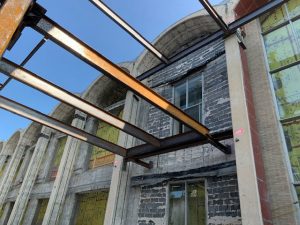
Photo by John Spaccarelli
Christine Ibrahim Puri, a senior majoring in economics and international, political, and economic development who is the founder and president of the Caribbean and African Student Association, said she was very excited at the prospect of a space set aside just for diversity. Even though she’ll graduate before it opens, she plans to come back and visit.
“I would come over from wherever I was in the world, because it’s something I really have faith in, and it’s something that my friends who have already graduated have advocated for,” she said.
Puri came to Fordham from Nigeria and commuted to campus her first year. The transition was not easy, she said, and in fact, three of her Black friends left Fordham that year. A space like this will go a long way toward retaining students of color, she said.
“The Office of Multicultural Affairs was the first place I visited when I arrived and was the place that really got me acclimated. It’s not just a professional thing or an academic thing. While they’re keeping you on track and making you do events and programs, they’re also there for you personally. They’re like your friends, always checking in on you,” she said.
She also said a new, larger, dedicated space will allow for collaborations between cultural groups, and ultimately, more inclusive events.
“It would be so much easier, and I think more students would be open to going,” she said.
A Modern Space for All to Gather
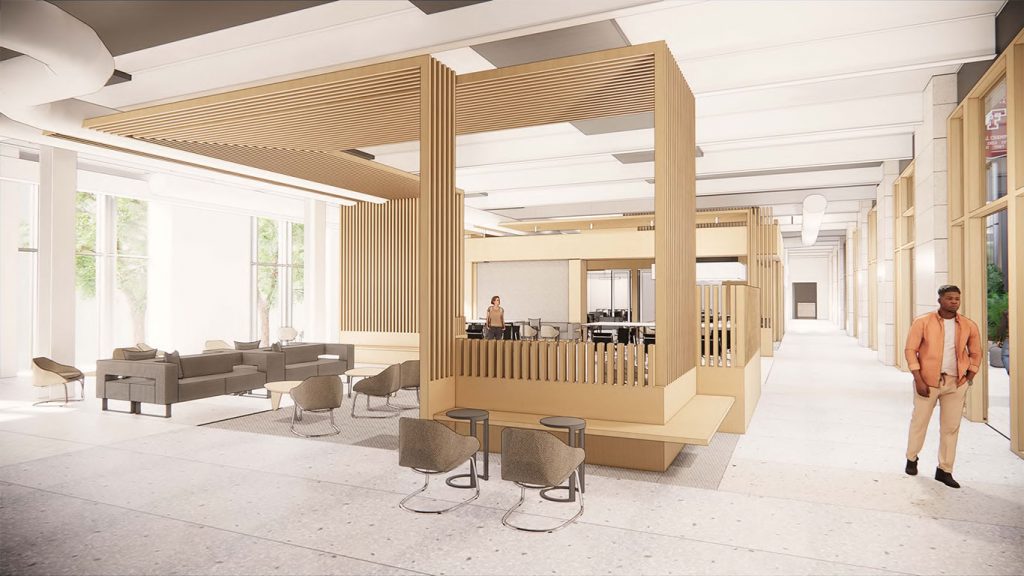
Larry Peifer, a designer for the HLW architecture firm, said he felt like a kid in a candy store when he was tasked with laying out the new center, because it has everything from office space, to lounge space, to fitness, to dining areas.
Few places best better illustrate how the University is thinking about students in an all-encompassing way than the first floor, which, when complete, will feature the student lounge, the gallery, and the reimagined Marketplace.
The lounge, which at 9,500 square feet will be double the size of the current student lounge, will benefit from its proximity to the gallery, which will have the capacity to accommodate screenings of films and sporting events. It will also be right near the dining area, known as the Marketplace, which will be designed to evoke the vibrancy of a farmer’s market. A new Grab n Go kiosk will be accessible from the Gallery for those who wish to grab snacks or enjoy a freshly brewed coffee.
Pool Anyone?
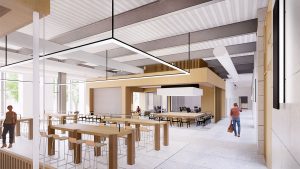
The lounge will be divided into several “sub-environments”: an area for active socializing featuring a pool table, vending machine, and soft seating; a section with tables that you could saddle up to with your laptop and a cup of coffee, Peifer said, and a quieter, den-like area with a lower ceiling that’s more conducive to reading or studying. Two AV-equipped meeting rooms that can be combined into one larger room will also provide space for collaborating and group study.
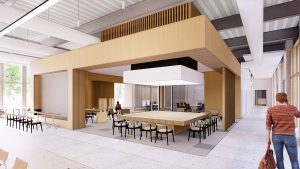
“I think it’ll be a really transformative project. The University has been really extremely progressive and has pushed the envelope with the design and programmatic strategy of the facility,” he said, noting that he felt it would be a case study for other universities.
Jeff Gray, senior vice president of student affairs, agreed.
“We hope the new student lounge space, and all of the expanded spaces within the new campus center that will be dedicated to our students, will provide much-needed spaces for student gathering, socializing, and programming, all of which will foster student engagement and a sense of community,” he said.
On December 14, Mark Valera, vice president for facilities management, and John Spacarelli, director of special projects and facilities gave a “Behind-the-Beams” tour of the construction of the new Rose Hill Campus Center. Watch below:
